#also Reuental
Note
hi. could you recommend medieval literature? thank you :)
uuh, yes i can but that really depends on the fact if you can understand german! i dont know if there are english translations of it (i read them in dual language editions, with middle high german and new high german) - i only have read one book that is not german
But in case you can, here are the ones i read in the past year (the not german one is the last one):
Collection of poems by Walther von der Vogelweide - one of the most famous german speaking minnesänger, lived from 1170 - 1230, and has stolen my heart with his diss tracks to the pope; author of the Famous 'Palästinalied' written as propaganda during the crusades
Collection of poems by Neidhart von Reuental - another important german speaking minnesänger, born around 1180/90, so a younger contemporary of Walther, sings a lot about the 'stupid peasants' and how they try to emulate life of the nobles (great fun, the peasants hated him); the Neidhart persona was very self depricating, depticting an unlucky knight; my favourite song of his is 'Meie din liechter schin'
Der Ackermann by Johannes von Tepl - probably one of my absolute favourite books ever, written in the early 15th century as a story for a friend of Johannes von Tepl, who himself was an educated man from northern bohemia; technically already early new high german and not middle high german; the story is a dialogue between a man and death - the mans wife has just died and he starts insulting death, demanding to bring her back. it goes back and forth, and they discuss life, death, humanity creation, god and grief. i loved it
Ein kurtzweilig Lesen von Dil Ulenspiegel - written around 1515 by an anonymous author in early new low german; german speaking people are more familiar with the modern name Til Eulenspiegel. I grew up with the modern adaptations of the story, but the late medieval ones are so, so much more crude. it is a collection of short stories, telling the tale of Dil Ulenspiegel, a silly boy/young man who does silly things. a medieval comedy, nothing profound. the original print has nice wood cut illustrations. it was widely popular, because medieval people could read (although they couldn't necessarily write)
Parzival by Wolfram von Eschenbach - written around 1200-1210 in southern germany, picks up athurian legend. i am half way through and have personal beef with wolfram. but it is good, a lot of depictions of noble life and medieval morals and ideas. makes A LOT of references to other writers of the time, including Walther von der Vogelweide, Gottfried von Straßburg (see next book) and Hartmann von Aue (see below)
Tristan by Gottfriend von Straßburg - written around 1210, is the german adaptation of the tale of Tristan and Isolde. I have not read it yet, but the books are on my shelf to be read as soon as I am done with Parzival
Erec by Hartmann von Aue - written around 1180/90 is said to be the first arthurian story written in german and an adaptation of the old french Erec et Enide - same as above have not read it yet
Iwein by Hartmann von Aue - second arthurian story, written around 1200, also adaptation of the old french story - same as above i have to still read it
The tale of the two lovers by Aeneas Sylvius Piccolomini (future Pope Pius II) - written in latin (there are english translations!) in the mid 15th century for a friend while at the court of Vienna, this is the most famous medieval erotic novel we have! It is about a married woman falling in love with one of the holy roman emperors men while they visit the town in italy she lives in, and the spicy affair they end up having, probably based on a similar story that happened. Aeneas lived a wild life and was old beyond his age, having 2 kids with two different women in two different countries out of wedlock and being a well travelled poet. he also hated women, like, A LOT. after he became pope he wanted to supress the circulation of the book, but is was a best-seller so it didnt work evidently, as i have read it in the 21st century
In addition to that, as a historical fencer I also read the sources, but these will be boring to people who dont care, but here are some anyways:
The Art of Swordsmanship by Hans Lecküchner - most famous source for Langes Messer techniques
Das Fechtbuch by Albrecht Dürer - yes, THE Dürer wrote a fencing book, completely in verse with nice illustrations!
Jude Lew - his fencing manuals are also nice, no illustrations only text
Hope this helps in a way.. again, i read mostly german medieval literature, so idk if this is useful as idk if any of these books have been translated
#personal#medieval literature#middle high german#medieval studies#any real medievalists could add something that is more useful#i am just a hobbyist reenactor
11 notes
·
View notes
Note
if ur still doing the character meme: reinhard lotgh?
yessss thank u I have many thoughts abt him
Sexuality Headcanon: has never once been attracted to a woman ever in his life. tbf not sure he's ever knowingly been attracted to anyone who isn't kircheis. everything else is just. well he really wants another want to be a worthy rival/nemesis in a way that isn't not kind of erotic but like. it's not Just erotic it is also very much abt wanting to die in battle to a ~worthy opponent
Gender Headcanon: so like. in canon I do think he's a cis man especially considering how strictly gendered the empire military is and he doesn't seem to have much space in his brain left over for exploring his gender. however I do sometimes enjoy rotating trans possibilities in my head and I am compelled by the thought of transmasc reinhard bc I think that. given his ambitions he knows that he needs to be in the military, which means he needs to be/pass as a man (and also given what happens to annerose I think he has specific motivation to not want to navigate the world as a women), and I do enjoy stories abt people who crossdress for plot reasons and then decide that they're trans actually
A ship I have with said character: he and kircheis sure are in love
A BROTP I have with said character: I am obsessed w his weird complicated friendship w hilde, how she's the closest thing he has to a friend but he doesn't fully trust her bc he doesn't fully trust anyone, her going against his orders to save his life at the end of season 2 and him thanking her but not being able to forgive him, their inevitable lavender marriage, their "butch hitting on a twink she thought was a butch" energy,
A NOTP I have with said character: uncomplicatedly romantic het4het reinhard/hilda I guess? extremely important to that dynamic to me that they are a gay man and a lesbian. like I can't really see him properly dating anyone other than kircheis but like. I'm certainly not opposed or immune to any of the homoerotic potential of his relationship w like. reuental or whoever
A random headcanon: I think it would be fun if he and kircheis used to cut each other's hair. y'know. the intricate rituals of it all. the intimacy & vulnerability, etc etc. trusting someone else to shape ur appearance and therefore ur public image. and that's partially of why he grows it out after kircheis dies
General Opinion over said character: he's so beautiful and so sad and so terrible and I want to study him like a bug. love that he's like. not wrong that the aristocracy is bad except unfortunately he's so much a part of the society that created him that he doesn't have any other way of dealing with it except with more militarism & imperialism & autocracy which does not fix anything in the longterm and will lead to his inevitable and tragic downfall. and also I think it's funny when he makes policy decisions that help the people without seeming to actually like. especially care abt that and everyone is like "oh wow maybe dictatorships are good actually." but yeah in general I love it when characters are tragic and gay and fucked up. and also I cannot wait to see the continually unfolding consequences of letting a 24-year old with a death wish become the most powerful person in the galaxy
4 notes
·
View notes
Note
i have an agenda anyway so, for the ship bingo: lietpru
That's a choice asking me, but I respect the determination!
Ship Bingo

Honest to God, first association was that time in february when the medieval crusades into Eastern Europe where implicitly mentioned in a poem by Neidhart von Reuental in my Medieval Music Middle Ages Reception class. I regrettably know very little about Eastern European history and I also regrettably ship mostly on the grounds of historical relations or cultural compatibility. Which nearly any ship can produce if you dig deep enough, but as I said - Haven't done any digging here.
I also don't ship Gilbert seriously with a lot of people? I think he is at his funniest when he is socially inept as shit and let's crushes fester, but never has the balls to say anything. And I do love our Lithuanian, but beyond "Toris is good boy, holder of the braincell, best man", I have very little thoughts on him.
So yeah! I think that ship has the potential for some absolute disaster. I love me a good hate-love, these two could get on each other's nerves so good, it'd be hilarious. I am sure that this ship could also be much more, certainly intense and dramatic and intriguing ... but to me, who lacks info beyond their Hetalia interactions and extremely limited historical knowledge, it is mostly funny and high-energy. That's why I circled the divorce field.
#beareplies#yandereleorio#aph#hws#hetalia#aph prussia#hws prussia#aph lithuania#hws lithuania#lietpru
9 notes
·
View notes
Text
One of my favorite things about Xbc2 Japanese twitter is the sheer amount of people losing their shits when they realize that Malos is Yuuichi Nakamura who simply sounds nothing like himself. So it's not just me, hey?
#I had the same whipelash when they casted Takahiro Sakurai for Ashihana in Karakuri Circus#idk seiyuus are so often typecasted it's just surprising in the best way#though for Nakamura I imagine he's somewhat similar as Reuental in the LOGH remake#I haven't reached this point yet but considering the character... yeah#it's simply that I mostly know him for Tomoya and Buccelati you know....#see also: a lot of gintama cast
6 notes
·
View notes
Photo
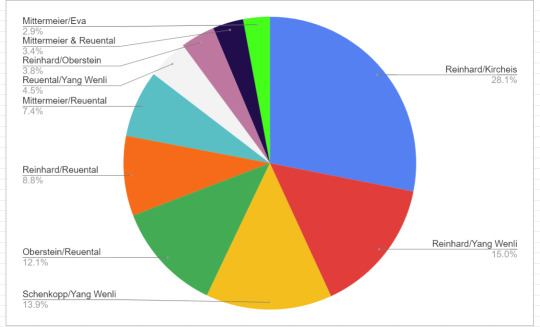


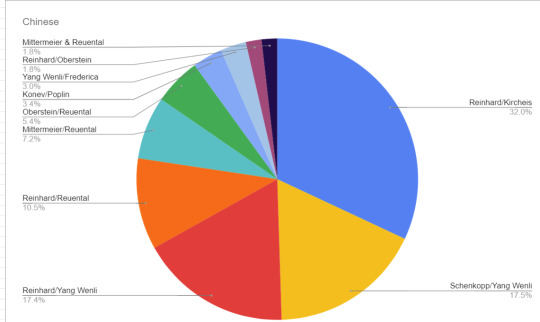

I made pie charts of the breakdown of LoGH pairings by language on AO3, because the different demographics have always interested me. The fifth one only includes the three main languages, so it’s not 100% accurate, but that’s how it roughly breaks down. Basically, Russian fandom skews towards the Imperial side with regards to ships, leading to some rarepairs showing up near the bottom of their top 10. Meanwhile English fans are most likely to include the canon het ships of Yang/Frederica, Reuental/Elfriede, Reinhard/Hilda, and the Mittermeiers. Reuental & Mittermeier is the only platonic relationship that makes it into the top 10, and it does so in all three languages. You’ll also notice that Reuental’s roguish charm is such that he has a different rarepair making it into the top 10 in all three languages! In Russian, he and fan favorite Oberstein even defeat Reinhard/Kircheis, who reign supreme in the other two languages. This is enough to launch them into the top 10 overall, despite not placing in either English or Chinese.
#already noticing some fuckups with color consistency#please forgive#Legend of the Galactic Heroes#also i used r & m's Official spellings but completely blew it with Wittenfeld lmao sorry#oh FUCK ME is it actually reuentahl lmao#I quit#by 'chinese' i should've specified mandarin btw since there's almost no cantonese fics
15 notes
·
View notes
Photo

Im obigen Bild kann man eine Handschrift auf Mittelhochdeutsch sehen. Heutzutage bin ich begeistert über diese alte Sprache, und ich versuche, seine Grammatik und Syntax zu kennenlernen.
Man sprach Mittelhochdeutsch zwischen 1050-1300, dann sprach man Spätmittelhochdeutsch. In dieser Periode erschien die berühmte Werke, besonders die Dichtungen. Man kennt vielleicht Walther von der Vogelweider, Neidhart von Reuental, und andere Menschen, die „Minnesänger“ heissen.
Ich möchte studieren, wie in dieser Sprache die Verben französischer Stammung eingegangen sind. Es ist eine sehr interessante Frage.
(Achtung: Deutsch ist nicht meine Muttersprache, also sagen Sie mir, ob ich einen Fehler gemacht habe).
#mittelhochdeutsch#deutsch#langblr#hochdeutsch#althochdeutsch#deutschesprache#deutschesprachgeschichte#sprachkenntis#Deutsche#deutschland#walthervondervogelweide#neidhartvonreuental#minnesang#minnesänger#indo-european#proto-germanic#wortbildung#dichtungen#fremdsprachen#deutschalsfremdsprache
2 notes
·
View notes
Text
Minnesang was a tradition of lyric- and songwriting in Germany...

Minnesang was a tradition of lyric- and songwriting in Germany that flourished in the Middle High German period, which began in the 12th century and continued into the 14th. People who wrote and performed Minnesang were known as Minnesänger, a song was called a Minnelied. The name derives from minne, the Middle High German word for love, as it was Minnesang’s main subject. The Minnesänger were similar to the Provençal troubadours and northern French trouvères in that they wrote love poetry in the tradition of courtly love in the High Middle Ages.
In the absence of reliable biographical information, there has been debate about the social status of the Minnesänger. Some clearly belonged to the higher nobility – the 14th century Codex Manesse includes songs by dukes, counts, kings, and the Emperor Henry VI. Some Minnesänger, as indicated by the title Meister (master), were clearly educated commoners, such as Meister Konrad von Würzburg. It is thought that many were ministeriales - members of a class of lower nobility, vassals of the great lords. Broadly speaking, the Minnesänger were writing and performing for their own social class at court, and should be thought of as courtiers rather than hired musicians. Friedrich von Hausen, for example, was part of the entourage of Friedrich Barbarossa, and died on crusade. As a reward for his service, Walther von der Vogelweide was given a fief by the Emperor Frederick II. Several of the best known Minnesänger are also noted for their epic poetry, among them Heinrich von Veldeke, Wolfram von Eschenbach, and Hartmann von Aue.
The earliest texts date from around 1150; the earliest named Minnesänger are Der von Kürenberg and Dietmar von Aist, clearly writing in a native German tradition in the 3rd quarter of the 12th century. This is referred to as the Danubian tradition. From around 1170, German lyric poets came under the influence of the Provençal troubadours and the French trouvères. This is most obvious in the adoption of the strophic form of the canzone, at its most basic a 7-line strophe with the rhyme scheme ab|ab|cxc, and a musical AAB structure, but capable of many variations. A number of songs from this period match trouvère originals exactly in form, indicating that the German text could have been sung to an originally French tune, which is especially likely where there are significant commonalities of content. Such songs are termed contrafacta. For example, Friedrich von Hausen’s “Ich denke underwilen” is regarded as a contrafactum of Guiot de Provins’s “Ma joie premeraine”.
By 1190, the German poets began to again break free of Franco-Provençal influence. This period is regarded as the period of Classical Minnesang with Albrecht von Johansdorf, Heinrich von Morungen, Reinmar von Hagenau developing new themes and forms, reaching its culmination in Walther von der Vogelweide, regarded both in the Middle Ages and in the present day as the greatest of the Minnesänger. The later Minnesang, from around 1230, is marked by a partial turning away from the refined ethos of classical minnesang and by increasingly elaborate formal developments. The most notable of these later Minnesänger, Neidhart von Reuental introduces characters from lower social classes and often aims for humorous effects.
Only a small number of melodies have survived to the present day, mainly in manuscripts dating from the 15th century or later. There are a number of recordings of Minnesang using the original melodies, as well as Rock groups such as Ougenweide performing songs with modern instruments.
In the 15th century, Minnesang developed into and gave way to the tradition of the Meistersänger. The two traditions are quite different, however; Minnesänger were mainly aristocrats, while Meistersänger usually were commoners. At least two operas have been written about the Minnesang tradition: Richard Wagner’s Tannhäuser and Richard Strauss’ Guntram.
7 notes
·
View notes
Text
Commentary regarding Icebergs (1 to 4)
· Ice: The Free Planets Alliance idiotically splits their 40,000 ships into three fleets far apart from each other
· C’mon, it was a nice idea, the execution was the problem here. That, and the commanders’ pride
· -
· Ice: Meanwhile, Reinhard and Kircheis make moon-eyes at each other
· We all have to admit that, when we start this, there’s a lot gazing into each other’s eyes that makes you a bit suspicious
· -
· Ice: Reuental and Mittermeyer go on a date
· YOU GUYS KNOW I ACTUALLY SUSPECTED THEM OF BEING A COUPLE
· -
· Ice: Kircheis gently nudging Reinhard to be a bit more empathetic than comes naturally to him.
· I agree with this
· -
· Ice: Annerose is a tragic figure, and on the surface she’s characterized as a pretty one-dimensional martyr-type, which can be frustrating and confusing in a show where even the most minor character contains multitudes. But Annerose does contain multitudes—they’re just hidden under a series of facades, erected by a woman who has been subjected to a decade of sexual slavery
· I hate to say it, but this is true
· Still don’t like her though
· -
· Ice: and by a creative team that was trying, in 1988, to tell a story about two boys falling in love.
· Ok, I wasn’t expecting them to jump right into it, but let’s go
· Maybe they’ll convince me
· -
· Ice: She is beautiful, docile, and a victim, the quintessential damsel in perpetual distress. She feels like a symbol, in a world richly populated by humans; her identity is presented to us as revolving entirely around men. There’s no way around it: As our first named female character, Annerose is irritating as hell
· I ain’t gonna disagree with this
· -
· Ice: the fact that in the LoGH novels and short stories, Annerose is heavily implied to be Kircheis’s love interest, whereas in the anime, Kircheis’s love interest is Reinhard. There are a few ways we know for sure that this was an intentional divergence, which we’ll definitely bring up when we get to them
· I’m curious, cus the show did sell me the whole romantic subplot between Sieg and Anne
· -
· Ice: Yang takes command of the remaining fleet after his commander is injured, and promptly outsmarts Reinhard when Reinhard tries to split his fleet down the middle by…splitting the fleet down the middle himself. This forces the battle to become a clear metaphor for the endless futility of this 150-year-war
· THAT’S VERY TRUE, NICE
· -
· Ice: Yang’s history and relationship with Jessica will get fleshed out more in the future
· Guys
· No, guys
· Jessica was awesome
· She was an amazing female character
· I’m still very sad that she had to die so soon
· And without accomplishing much (or having much airtime)
· -
· Ice: But also 2) train yourself now to peel away any heteronormativity that’s coloring your assumptions about what the show wants you to think.
· Ice, I think you’re starting to push it…
· -
· Ice: Who is this mysterious and beautiful baroness attempting the sisyphean task of cheering up Annerose? Why, it’s Magdalena von Westfalen
· I LIKED HER AND THEN SHE DISAPPEARED FROM THE PLOT, WHAT HAPPENED
· -
· Ice: Magdalena takes absolutely no shit from anyone, and I (Elizabeth) would die for her.
· Same
· -
· Ice: Who the fuck is this person? Yang has a “ward”? Why? IS YANG BATMAN?? These are all good questions to be asking yourself.
· Yang trying to be Batman would be hilarious
· Cus I just see him complaining every step of the way
· -
· Ice: Character development in small visual details: Julian styling his collar and sleeves to exactly match Yang here shows his hero worship and desire to emulate him.
· OOOOOOOOOOOOOOOOOOOOOOOOOOOOOOOOOOOOOOOOOOOOOOOOOOHHHHHHHHHHHHHHHHHHHHHHHHHHHHHHHHHHHHHHHHHHHHHHH
· -
· Ice: White men: eating this nationalist crap up. White women: feeling slightly uncomfortable but not saying anything. POC: so over Trunicht’s bullshit that they literally all faked sick to avoid him.
· Ok, no, I’m loving this
· -
· Ice: By now I’m sure you’ve noticed that the power structures in LoGH are incredibly male-dominated. (…) Hell, LoGH doesn’t indisputably pass the Bechdel test until episode 103 out of 110.
· Story of my life…
· -
· Ice: The handful of female characters that we do get to know exist within this society as fully defined individuals
· Ok, this I don’t completely agree with
· The author tries to give some sort of dimension to the female characters he creates, but they all end up… limited. And not in the way that represents “Oh, society doesn’t let women do what they want”, but simply in the way that women… are still women. And this is extremely hard for me to explain.
· I’m conscious that all the women in the show are women. And you probably are going “Yeah, and what’s the problem with that?” but that’s the thing. Like being blond or black or needing to wear glasses, it should just be a characteristic and not something that defines them (even if society then stereotypes you and forces you into going through certain events that become common for said characteristic – however, said experience is always personal). A female character in LoGH is female first and then something else.
· That isn’t to say that what the author did with his female cast isn’t great, because it is. He cared enough to portray their struggles, even if he didn’t identify with them (and because of it, they feel somewhat generic), and I’m pretty sure that the years the novels and the animated show came out in weren’t as kind to female characters as he was. However, by our current standards, it’s very lacking.
· I’m not sure I managed to express myself well, but I’m moving on.
· -
· Ice: Meanwhile Julian, a 14-year-old boy, happily and enthusiastically keeps house for Yang, cooking and cleaning and making tea. While many of the female characters overtly break with the traditional roles assigned to women (by entering politics, the military, etc.), Julian is one of the only characters to push in the other direction; and it’s important that (spoiler) the show never plays this for laughs or really remarks on it at all
· Huh, this is true
· Very true
· And I never realized that
· Nice one, show!
· -
· Ice: And again we see his passivity as he lets the silence stretch until she finally walks away.
· Kinda of one of the reason why Yang sometimes pissed me off
· -
· Ice: Kircheis is rudely accosted by the sinister Oberstein.
· Not a fan of Oberstein, I see
· Well, I was informed of it, so I was expecting it
· -
· Ice: Oberstein absolutely uses his malfunctioning robot eyes to intimidate people and then pretends he was unaware.
· I like this idea, but at the same time I really think he’s just like thatTM
· -
· Ice: But first, Oberstein. We’ve seen glimpses of him in the background before now, but it’s finally (deep sigh) time to meet everyone’s least favorite character. You probably don’t hate him yet, but you will. Oh, you will!
· HA!
· -
· Ice: Kircheis, a very smart boy, hates Oberstein pretty much the second they meet.
· I actually disagree
· I think Sieg was wary of Oberstein
· But to be honest, I never thought Sieg hated him
· In fact, I think Sieg would one of the few that would almost like Oberstein
· -
· Ice: we’ll have plenty of time to hate Oberstein later on
· COME AT ME
· -
· Ice: Almost as soon as Reinhard (jumping out of the car like a little kid, bless his heart)
· God bless his heart, indeed
· -
· Ice: Reinhard seems to interpret his father’s meaning to be that Annerose consented, or at least assented. Horrified, he sprints upstairs and demands to know why she would do such a thing. Her answer, adding yet another layer of Fucked to this already Extremely Fucked situation, is basically, “I’m doing it for you.”
· Ice: No pressure, Reinhard!
· *aggressively points to this*
· -
· Ice: Kircheis, with no direct way to help, does the only thing he can: He follows Reinhard on a dangerous, er, mission in the hope that he can maybe keep things from escalating too much. Which… is pretty much Kircheis’s job in life, to be fair.
· God bless that boy, he tries so much
· -
· Ice: Reinhard has never, not once in his life, chilled.
· THAT’S WHY WE LOVE HIM
· -
· Ice: This is a huge turning point for Reinhard, who finally has somewhere to aim his ambition: He’s going to do whatever it takes to get Annerose back, and if that means rearranging the entire universe to suit his needs, that’s what he’ll do.
· Like the way Ice expresses this. Rein has an enormous amount of ambition, but said ambition had yet to take a shape. This sentence implies that Rein could have used it in other areas, but it was this event with his sister that ultimately guided him unto a specific path. I like that idea a lot.
· -
· Ice: Kircheis isn’t going with Reinhard because Annerose wants him to; he isn’t even going with Reinhard because Reinhard wants him to: Kircheis is going with Reinhard because he wants to.
· THIS
· -
· Ice: I assume Reinhard looks so relieved here because he somehow managed to walk successfully down a flight of stairs backwards.
· I THOUGHT THE SAME THING
· -
· So far, I’m enjoying Icebergs
· I think the homosexual subtext they’re trying to read into is kinda forced, but nothing too grating so far
· -
5 notes
·
View notes
Text
Episode 30: Lost Things

March 18, 798/489. In the Empire, Reinhard’s fleet prepares to warp Geiersburg Fortress into the Iserlohn Corridor. On Iserlohn, Yang prepares to submit to a dubiously lawful inquiry by the hostile—but democratically elected!—Alliance government. Hilda convinces Mecklinger to pay a visit to her sick cousin, who teaches us all about the importance of having hobbies. And Geiersburg’s test warp, thanks to Kempf and Mueller’s adept leadership, goes off without a hitch. Meanwhile, Reinhard sinks deeper into depression, Julian blows off steam at the shooting range, and Reuental and Mittermeyer (you guessed it!) go on a date.
Reinhard Alone

Reinhard may be dead inside, but he still looks amazing. Episode 30, in particular, has some of my favorite animation in the series, so please enjoy all the ridiculously beautiful heartbreak as much as you possibly can through your tears.
We haven’t spent much time with Reinhard since the traumatic season 1 finale, so we’re long overdue for a check in with our fast-rising Empire-side hero. How’s he been doing?

Not great!
(From episode 28.)
Once you're immersed in how LoGH tells stories, it’s tempting to say that Reinhard’s newly sour affect “should come as no surprise,” given what he’s been through. And though that is true on an in-universe level—nobody who suffered the tragic loss of a long-time romantic partner only months ago should be expected to have recovered already—it would be disingenuous of me to suggest that surprise at the way LoGH treats Reinhard’s grief is unwarranted.
In my episode 26 post, I talked about how my past experiences as a queer consumer of media had primed me for LoGH to handle Kircheis’s death poorly, and what a surprise it was when my expectations were subverted. In that light, Reinhard’s grief—the way it changes him, the way it has a tangible presence, the way other characters tiptoe around and discuss it—is a surprise. It’s a constant reminder not just of how important Kircheis was (and still is) to Reinhard, but also of how committed LoGH is to treating its queer characters and their relationships with respect.
LoGH can be a difficult show to watch. Not only does it have over a hundred incredibly dense episodes to get through—some of which are basically impossible to parse unless you watch them more than once—but it’s also deeply, sometimes overwhelmingly sad. Depending on the context, though, that can be good, or at least validating. And Reinhard’s grief, upsetting though it may be, is fundamentally important to a queer reading of LoGH.
Like I said during episode 26, Kircheis’s death is a turning point for the slow dissolution of LoGH’s heteronormative surface reading. And the unflinching portrayal of Reinhard’s grief from here on out is evidence of an ongoing decision on the part of LoGH’s creative team to allow what was formerly confined to subtext to remain above the surface.
The Locket

The way Reinhard’s voice softens when he talks to “Kircheis” via his locket is dramatic and says a lot more on its own than is possible to express in a mere text caption. If you missed it the first time, definitely go rewatch this scene in episode 28 (the timestamp is 3:45) to get the full effect.
The most obvious manifestation of Reinhard’s grief is, of course, his locket, in which he keeps a family photo and a lock of Kircheis’s hair. Some of Reinhard’s colleagues, as I’ll get to in a minute, worry about him because of how much he’s changed since Kircheis’s death. But I would argue that a lot of what’s so disturbing about Reinhard’s transition into Life Without Kircheis is the lack of change, at least in one respect: He still relies on Kircheis for emotional support, as is evident in the gifs above, and for strategic advice, which we see a bit of in episode 30 (below), and will see more of in the future.

Hilda is particularly attuned to Reinhard’s new habit of playing with his locket whenever—were Kircheis still alive—he might have looked to him for input, approval, pushback, or whatever.
There’s nothing inherently unusual about accessing one’s memories of a departed loved one for guidance, but Kircheis was Reinhard’s only intimate relationship before he died, and now that he’s gone, Reinhard still shows no interest whatsoever in diversifying his support network. As a result, his only intimate relationship is now with an inanimate object—or, to put it another way, he has nobody.
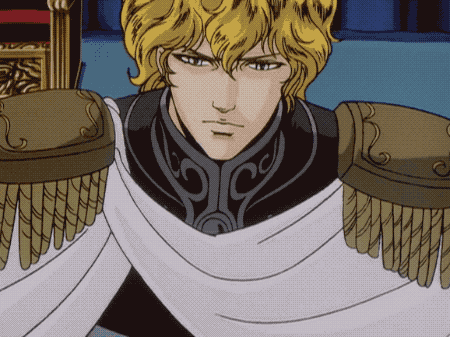
Of course, Reinhard’s isolation isn’t entirely self-imposed. Annerose was also a source of strength and comfort before she voluntarily withdrew from his life. If things had gone differently and Annerose had stayed, Reinhard might not feel so lonely—but would that have been healthier, for either of them? I’m not sure. My guess is: not significantly.
Other People
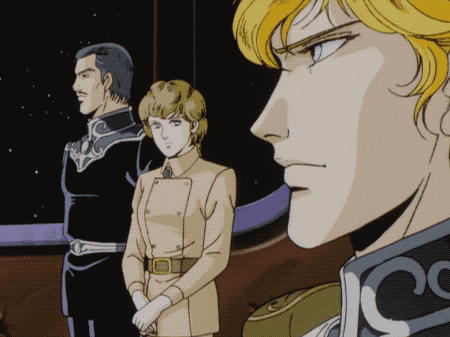
I’m not sure Reinhard realizes how obvious it is to everyone around him the extent to which he’s been utterly destroyed by Kircheis’s death. The fact that he wouldn’t care even if he did realize is, well, not unrelated.
From the relatively trivial to the life-altering, rumors and hearsay play a substantial role in our understanding of LoGH’s world and characters. Reuental and Mittermeyer, who have already spent a good deal of time gossiping about Reinhard and will continue to do so far into the future, are responsible for a good portion of the Empire-side gossip that we see—probably as a factor of their daily standing date. In episode 30, Reinhard’s two highest ranking admirals discuss the depths of his grief in vague terms:

It’s worth mentioning (as always) that Reuental and Mittermeyer’s bodies during this scene are beautifully aligned, without being symmetrical. The line of Mittermeyer’s torso is precisely parallel with Reuental’s left arm! Look at it! In case you hadn’t noticed, I am in awe of the animation team’s treatment of these two.
Reuental and Mittermeyer’s discussion of Reinhard and Kircheis is, of course, about more than just Reinhard and Kircheis—this is Reuental we’re talking about, after all, and he is pathologically incapable of saying one thing without also meaning at least five other things. For the time being, though, this scene mainly adds another, third-person dimension to Reinhard’s grief: We already know how it is affecting him personally; now we also know that it is affecting the people around him, that they’re aware of it, and that these are important enough facts to merit scenes of this length devoted to conveying them.
Hilda, on the other hand, is a lot less prone to gossip than Reuental and Mittermeyer—or maybe she just hasn’t found the right gossip partner?—so her feelings about Reinhard’s situation are communicated to us differently, mainly via looks (above) and internal monologue:
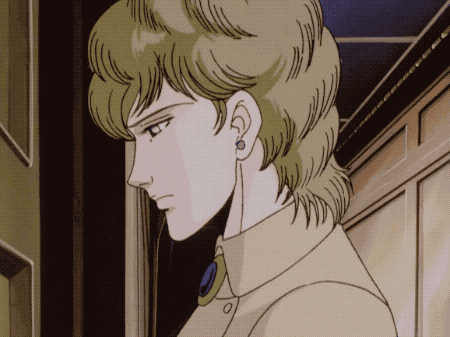
Worry not, dear reader: I’ll be spending tons more time on Hilda and her well-articulated emotional intelligence in the very near future. For now, feel free to repeat “Hilda knows everything” to yourself whenever you see her on your screen, because that basically sums it up.
I also love this little exchange, after Reinhard shuts himself away (again) in the room on Geiersburg where Kircheis died:
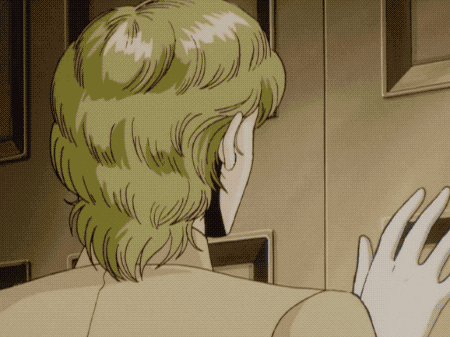
Kempf and Mueller’s quick look of mutual understanding here is so simple, but goes a long way towards expressing that the topic of Reinhard’s grief is never far from anyone’s lips among the admiralty.
These are all—even the lengthy conversation between Reuental and Mittermeyer—comparatively small moments in the overall landscape of LoGH. But taken together, they convey that Reinhard’s grief is not small; not for him, not for the people around him, and not for the galaxy.
Reinhard’s Oberstein Eyes
On a subtler character note, remember a few episodes back when Rebecca likened Reinhard’s eyes to Oberstein’s? Well, you may have thought she was being facetious, but she extremely was not. Allow me to demonstrate:

Here are Oberstein’s eyes as they appeared in episode 4. Their most noticeable trait is, obviously, the fact that they’re flashing red. But another distinctive characteristic of Oberstein’s eyes is that they don’t have any highlights or other details beyond the pupil and flat, uniformly blue iris.

In contrast, this eye-heavy moment from episode 28 is a good example of how eyes are typically animated throughout LoGH—with the remarkably consistent exception of Oberstein’s which are, of course, artificial. Mittermeyer and Reuental’s eyes here both have distinct highlights, and seem to move naturally.

Here’s an example, from episode 9, of how Reinhard’s eyes in particular have been depicted before now: Note the visible highlights that change and move with his expression. Reinhard’s eyes do a lot of characterization work for him, and obviously got a corresponding amount of attention from the animation team.
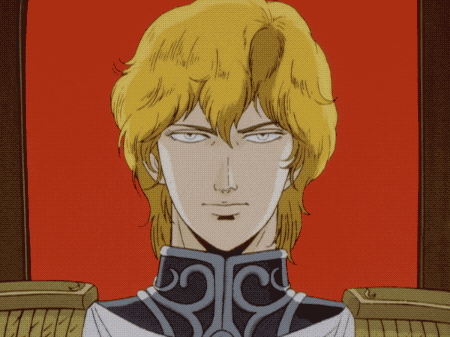
Compare that to Reinhard’s eyes here, in this moment from episode 27. Like Oberstein’s eyes, Reinhard’s irises are now flat and lifeless. They don’t move with the rest of his face and have none of the energy we’re used to seeing from him.

But unlike Oberstein’s, Reinhard’s eyes aren’t synthetic. So when he lets his guard down—which he can only do when he’s alone with his memories of Kircheis—we see unbridled pain and anguish flood back into them. Poor Reinhard.
Stray Tidbits
Can someone please explain to me exactly what is going on here? Why does Yang’s desk only go up to Schenkopp and Cazellnu’s knees? Why is Yang proportional to his weirdly tiny desk? Why is his entire head smaller than Schenkopp’s crotch? This single screenshot keeps me up at night with questions.
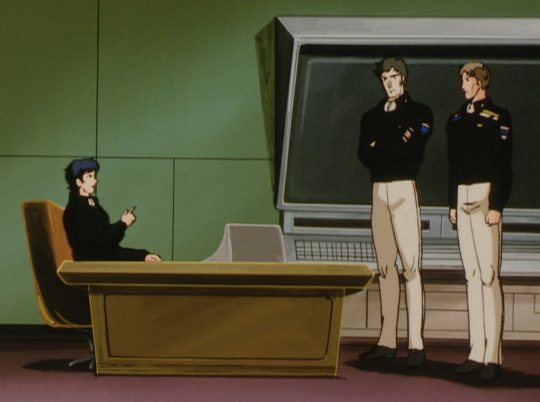
Maybe the furniture store that sold either Mittermeyer a tiny chair or Reuental a huge chair also has a location in the Alliance.
Try to imagine something more suspicious than not having a pet. How about liking books more than pets? Yeah, that’s what I thought.
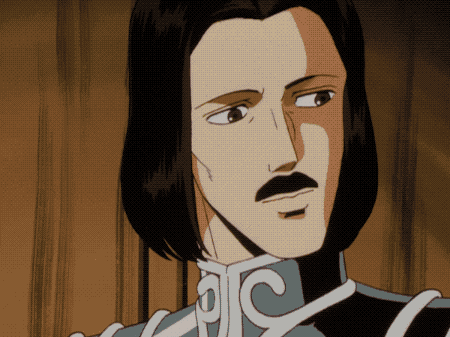

Time for some fun facts: Other than Da Vinci, the three historical figures that Hilda’s cousin mentions are Cao Cao, Lazare Carnot, and Tughril Beg. Biographical info on Cao Cao and Lazare Carnot makes it pretty clear they were both, like Mecklinger, Renaissance men who had a wide variety of cultural accomplishments in addition to their political/military careers; it’s harder to find information on Tughril Beg but my guess is that he falls into the same category.
#Legend of Galactic Heroes#Legend of the Galactic Heroes#author: Elizabeth#Empire#Reinhard#grief#queerness#eyes#Reinhard's locket#Geiersburg#gossip
21 notes
·
View notes
Text
LOGH Episode 11
Episode 11: The Actress Exits
This episode is set in the Empire.
The post may contain my personal opinion / commentary.
Locations:
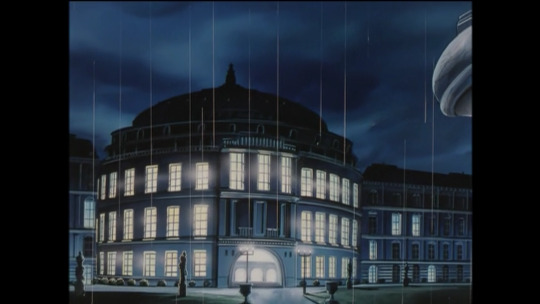
Imperial Theatre
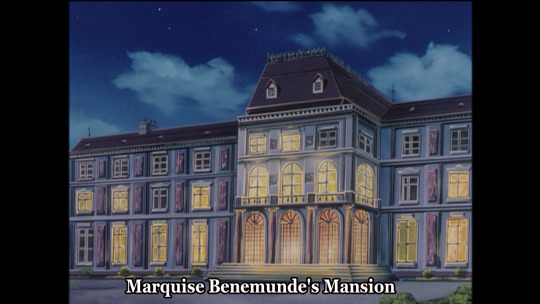
Marquise Benemunde's Mansion

Imperial Admiralty
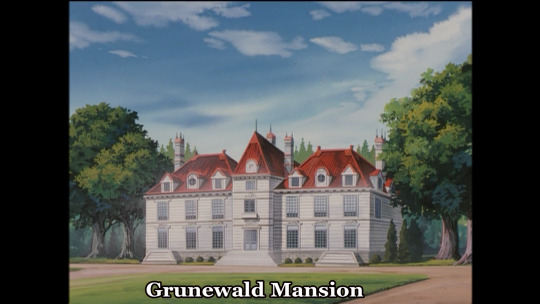
Grunewald Mansion

Little cottage
Characters:
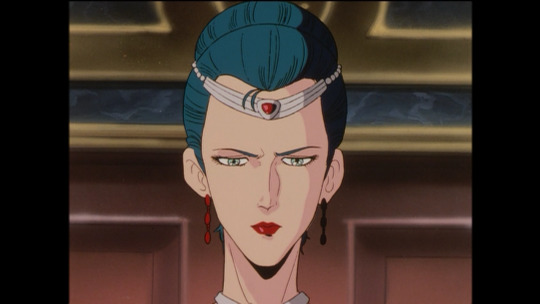
Marquise Susanna Benemunde
Misc:
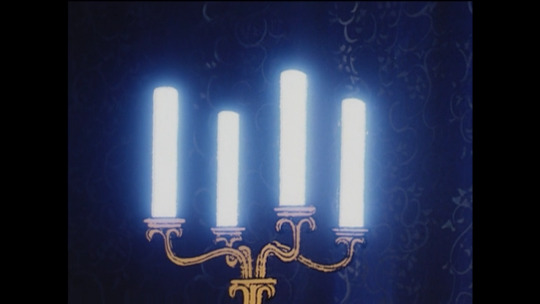
Glowing candle thingies (they look cool)
Narration:
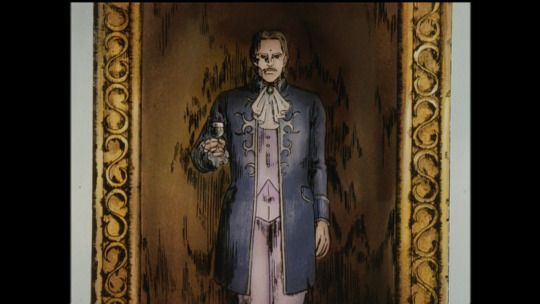
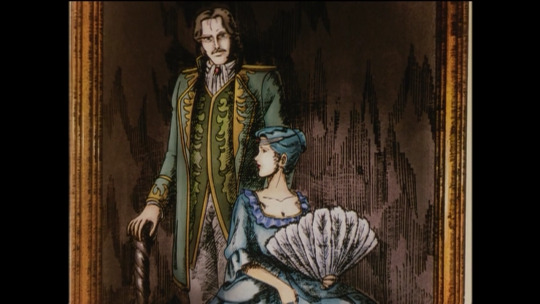
Friedrich IV succeeded to the throne at age 29. When he reached his mid-fourties, Friedrich IV sought beautiful companionship. For a time, Marquise Benemunde monopolized his favors. But that, too, did not last for long.
One day, on a street corner, an Imperial staff member saw Annerose von Musel, a 15 year old girl.
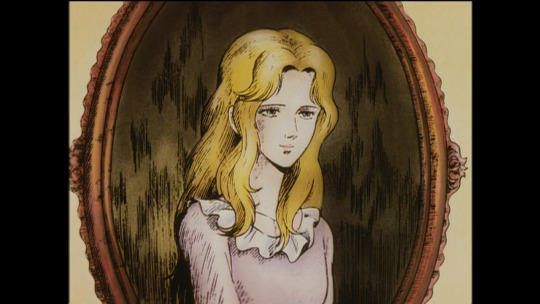
Annerose was summoned to court to accept Friedrich IV's attentions. (Yuck! I mean I knew that she was around that age but... she’s just a child. It's horrible.) She was given the title of Countess Grunewald. Annerose accepted her fate. That was 10 years ago.
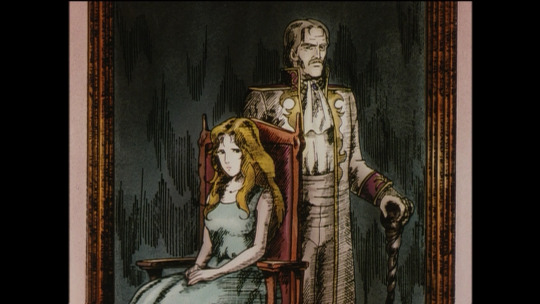
The story:
Friedrich IV and Annerose leave from a musical theatre performance. The marquise tries to speak to Friedrich but he turns away without answering her. The marquise blames Annerose as the reason for Friedrich not coming back to her.
Baron Flegel and the marquise discuss Annerose, Flegel tells her that the nobles think she is the reason of Friedrich's depression and "casting a shadow of ill omen" over the Goldenbaum Dynasty, and she should be ostracized from court along with her brother. Basically Flegel instigates her to bring Annerose to disgrace.
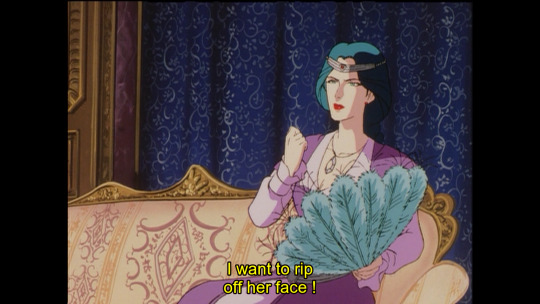
(Whoah there, lady!)
Flegel later talks to one of his allies and says that all suspicion should fall to Benemunde if something goes wrong. And also kill her so she doesn't speak of it.
Kircheis goes really philosophical!
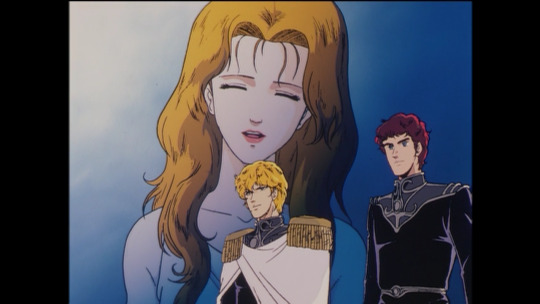
R: I had a dream last night. A dream when we were children. When the three of us, you, me, and my sister, were together.
K: Sometimes I wonder which is reality... then or now?
R: Then or now?
K: Yes. Maybe now is just a dream. Am I wandering in a long gallery of dreams? There are times when I think so. (No wonder, Kircheis, you have a loooot of flashbacks.) One day the dream fades, and I return to another day. When you and I were children, and Lady Annerose was still with us. And then I'd say to Lady Annerose. "I had a dream. Lord Reinhard and I became soldiers, important men, commanding warships and going to the ends of the universe."
R: Which reminds me of why I called you. (Wow, what a buzzkill, Reinhard! Kircheis was having a moment!) This was delivered today.
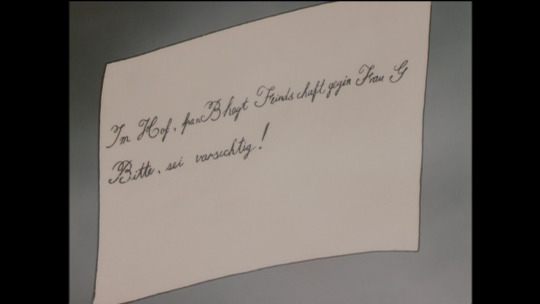
K: "Miss B plans to kill Miss G of the Court. Please be careful."
R: "Miss G"... Countess Grunewald, my sister. And "Miss B"?
K: Probably Marquise Benemunde.
R: I think so, too. In that case, there's no reason to stand idle. I'll have Oberstein investigate immediately.K: When someone is promoted to a position of power, how many others lose their positions? At Court, there's plenty of hatred, envy, and jealousy. All kinds of bad feelings grow. There are many who envy you and Lady Annerose. I think many plots may be brewing.
R: Yes.
K: A warning note like this is evidence your enemies have enemies. The most frightening thing is that those opposing plotters decided to join forces.
R: The Court is a spider's web. Plots ad traps are woven over and over again. That place isn't worthy of my sister.
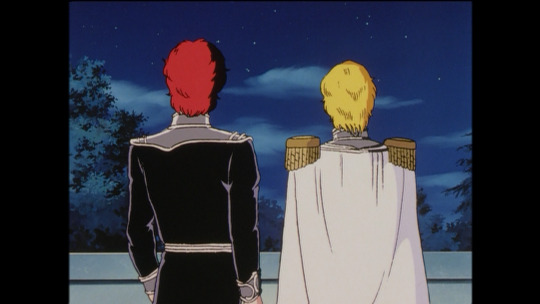
Narration:
The Galactic Empire began daily strategic meetings on the recapture of Iserlohn Fortress. Reinhard, as an Imperial Admiral, was required to attend these meetings. Meanwhile, rumors that Marquise Benemunde was planning to murder Annerose, were spreading wildly through the Imperial Court.
Benemunde gets sent away on Friedrich IV's wishes to her country manor.
Annerose gets a message about Reinhard getting badly wounded. She gets going immediately. Reuental and Mittermeyer notice her leaving from a car. They go search for Reinhard.

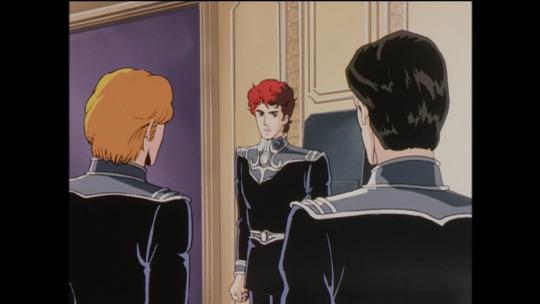
As he is in a meeting, they tell Kircheis who decides to deal with the situation without bothering Reinhard (after failing to contact Reinhard because bureaucracy). Reuental and Mittermeyer convinces him to let them help (they can identify the car, and they need to repay the trust Reinhard gave them).
Annerose's car gets ambushed and the perpetrators bring her to Benemunde in a small cottage. Benemunde insults her for a while. After that, she pours wine into a glass and pours some drug into it as well (which was hidden in her ring). She's planning to make it seem Annerose slept with someone and committed adultery against the Kaiser.
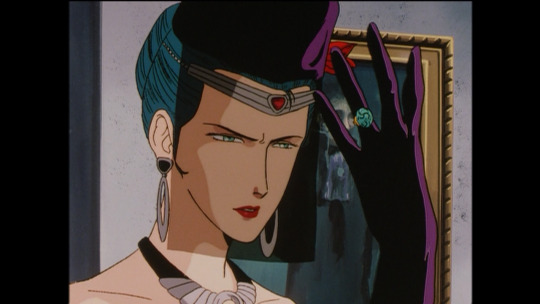
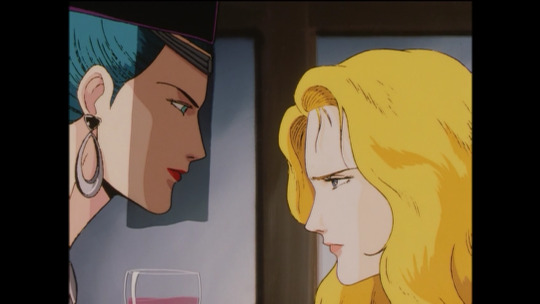

Kircheis, Reuental and Mittermeyer arrive at the place and two thugs start shooting at them. The trio overpowers them and gets into the house.
Benemunde holds a knife to Annerose's throat, and two thugs point guns at them, so only by the lights suddenly turning off can the trio overpower them. Benemunde escapes, Annerose didn't get any injuries. Oberstein appears, he was the one who turned the lights off.
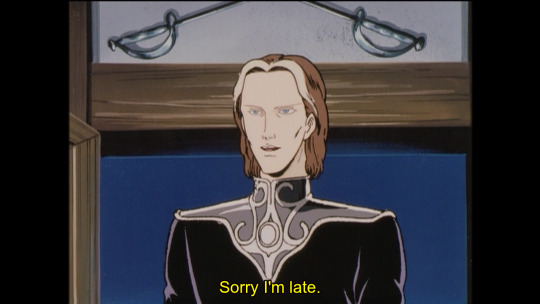
Kircheis and the other three explains the assassination attempt to Reinhard after the meeting is over. Kircheis tells Reinhard they don't know the identities of the men, but Oberstein did some research and he found that Baron Flegel is behind them, although he has no proof. But I guess Reinhard believes him either way.
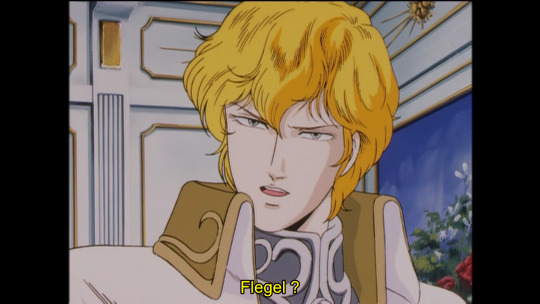
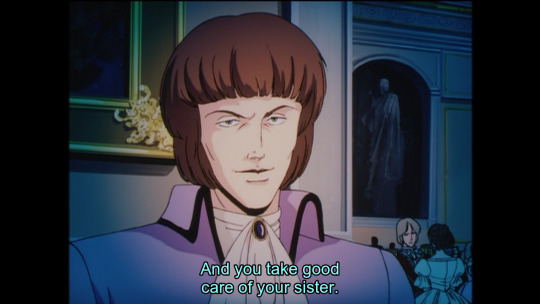
Flegel tries to ensure that his connection to the assassination attempt stays secret.
I guess Lichtenlade is also Imperial Prime Minister? Well, here's the Kaiser's arbitration: "For the crime of kidnapping and attempted assassination of Countess Grunewald, he sentences Marquise Benemunde to death. Because of his exceptional affection for her, she will be permitted suicide. Furthermore, because he still views the Marquise with courtesy, His Majesty will attend to her funeral.”
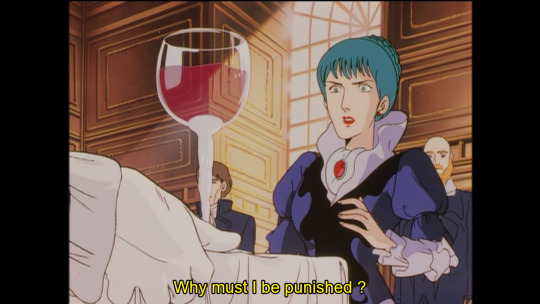
Um... because you tried to kill someone.
She spits on Reinhard then she is forced to drink the poison, and dies.
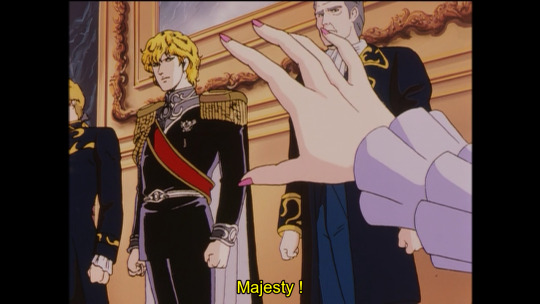
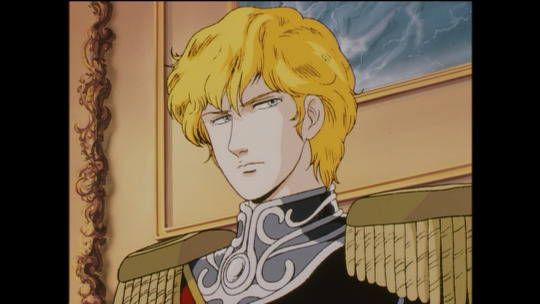
...Interesting choice of shot setting. She’s saying Your Majesty, and Friedrich IV is not in the room.
Reinhard meets Flegel on a corridor.
"Don't think you'll get away with it next time."
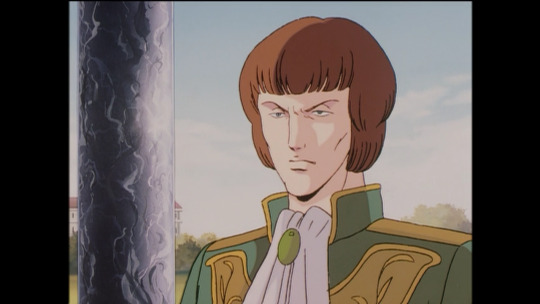
Reinhard and Annerose's conversation:
R: The Marquise Benemunde committed suicide.
A: Reinhard, please try to forgive her.
R: That woman? She tried to kill you.
A: Everyone, no matter who, feels sorrow, feels pain. Please try to understand her feelings. She once stood high on a pedestal. Now she's forgotten, and shut out of his heart. She must have felt a terrible grief.
R: Sister...
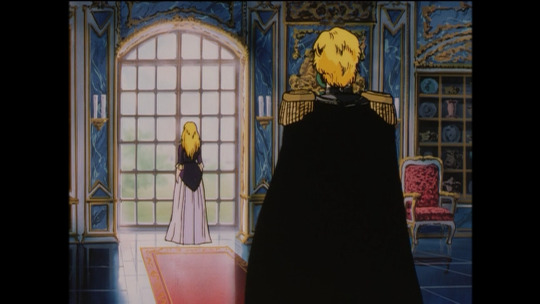
Interesting choice again, Annerose in the light, Reinhard in the shadows in his black cape.
I’m kind of having a feel of Reinhard being in a morally grey area, and that he would be a great villain actually. Maybe he will be. Kircheis and Annerose are very powerful sources of keeping him in line, and on the right path. Annerose does a great job in trying to improve Reinhard's emphatic skills. Annerose is a great character, and I love how they deepen our knowledge of her. I appreciate that Reinhard does not dismiss her comments, but actually seems to think about them. He seems to respect her a lot, and value her intelligence. I hope we'll see the results of this in the future.
I also like the choice of Reinhard wearing white or black clothing alternatively whether it's actually depending on his mood or not.
Narration:
The Galactic Empire's Goldenbaum Dynasty has begun to decline. The rot of decadence penetrates deeply into it's society. And incidents like this are the result. It was usual that such things be dealt with in secrecy within the Imperial Court. On the same day, Marquise Benemunde's death from a sudden illness was announced.
BONUS ROUND: Annerose is absolutely beautiful
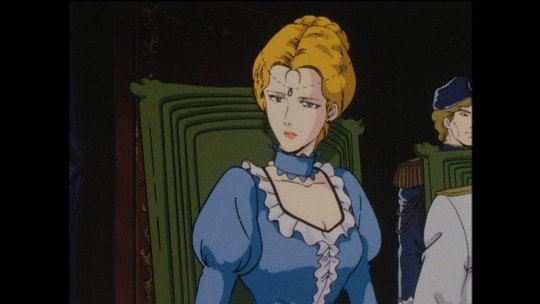

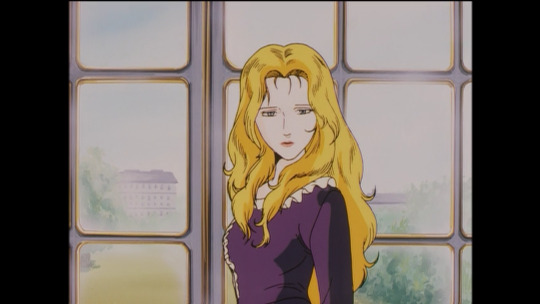
Episode 12: Advance Toward Imperial Territory
#logh#logh episode 11#legend of galactic heroes#legend of galactic heroes episode 11#logh episodes#my post
3 notes
·
View notes
Text
once again here is my weekly roundup post of what I'm watching/reading/etc. once again none of this is necessarily a recommendation, except the bits where I talk about my own fic. obviously everyone should read my fic
listening (podcast): nothing new here. continuing with the Wing episodes of Great Gundam Project, which continue to make me want to watch Gundam at all times. also keeping up with Palisade (Friends at the Table), my beloved, I love it when an actual play podcast episode is an extended discussion on spycraft and the changing political landscape, and also watching someone else flip a coin
also, I've listened to less A More Civilized Age recently because I'm less interested in KOTOR now that they're covering that, but I did listen to their episode on the imminently-closing Disney World Starcruiser attraction which. oof. great podcast episode, unsurprising that the ~experience was uhhhhh not worth how many thousands of dollars it costs
listening (music): changed the CD in my car to One-X by Three Days Grace. sorry for almost exclusively listening to music that was used for AMVs in the 2000s.
however! for once I listened to new music, the new Troye Sivan single, Got Me Started. nothing particularly smart to say here, it's fun and catchy and makes me wish it was 2018 and I was back in grad school having a single overpriced drink in a gay bar and failing to psych myself up enough to flirt with anyone
reading: still working my way through Rule of Wolves (truly would be more interesting if Leigh Bardugo did not always shy away from the political marriages that she teases at, at least then the political intrigue would have to actually happen on the page) and Water Outlaws (shout out to my new favorite side character, the nonbinary strategist who wants to overthrow the government).
also read the newest KJ Charles novel, A Nobleman's Guide to Seducing a Scoundrel. I always have a lot of fun with her stuff, she understands that life-threatening stakes and also secrets & betrayal are what I personally want in a romance. this one had some very fun intrigue around inheritance & legal loopholes, and also plot-important discussions of religion in Roman Britain. my main complaint isn't even a critique of the book itself, it's just that I as a person have slightly different priorities and I wish one of the main characters had been allowed to stay angry and maybe be more destructive about it. like I'm glad he's happy now that he's had his character development, and I do think it was well done. however. I would've found it personally cathartic if he got to do a few more crimes first
also also, this incredibly scathing academic book review (Was There an Administrative Revolution?, George Zhijian Qiao). it's a delight. I've seen some harsh rebuttals but nothing nearly as much of a masterpiece as this

watching: continuing to watch Elementary, which has its pros (competently-written mystery stories with fun characters) and its cons (can't tell if the copaganda has gotten more blatant this season or if it's just been building up and I'm getting tired of it)
also continuing my long slow journey of watching Legend of the Galactic Heroes. what a show. love an incredibly homoerotic military sci-fi anime about the narrative construction of history. season 3 has been kind of up and down for me, though, I must say. I love the parts about Reinhard being desperate to die in battle against a "worthy opponent," I love Reuental getting accused of treason presumably to foreshadow him actually doing treason at some point, I love Kircheis haunting the narrative, I love the vastly different tone whenever we see Yang being self-aware about history and his friends getting up to shenanigans. however. whenever the Earth Cult is the central focus I'm reminded how much I don't like that plotline. like. Idk. I'm not an expert but I know more well-informed people than me have talked/written about the prevalence of antisemitic conspiracy theory tropes in anime from this era and uh. that sure is present here and I don't care for it
the other thing I watched this week is 1985 horror film Re-Animator. my first note is "oh he's such a little freak I love him" (about the titular guy who reanimates the dead) and that really sums it up I think. is it a good movie? I mean. probably not. but I could write an entire thesis on the themes of procreation vs necromancy and how that subtextually makes the central conflict of the film a love triangle, and sometimes that's what really matters
playing: ran a session of Blades in the Dark while partially out-of-it from the flu shot/covid booster combo. this was the third session of a single score, and by the end of it everyone only had one (1) remaining stress box but somehow no one trauma-ed out while escaping the ancient winged robot/ghost lady whose gambling hall they were robbing (they stole her reality-bending dice that she made out of her own bones)
I've been enjoying Ace Attorney 5 more this week, the second half of 5-3 and the beginning of 5-4 have been a lot of fun. it really is a shame that Robin's gender is handled Like That because otherwise 5-3 would be such a good case. I'm not far enough into 5-4 to say much about it other than that I like it so far but truly my main observation is, if two astronauts were on the launch pad, and one of them killed the other with a knife, would that be fucked up or what?
making: made butternut squash pasta sauce with the rest of the squash left over from last week's muffins. we used this recipe, largely because it involved roasting the squash in the oven instead of standing over a stove waiting for liquid to reduce (substituted oat milk for the half-and-half, it turned out fine and just didn't needed the added pasta water)

here it's on mushroom ravioli, but we also added it to baked mac & cheese to add some more vegetable to that
drinking: sorry that all of this is so aggressively seasonal, unfortunately I love a lot of ~fall flavors~. anyway. shout out to Citizen Cider's Baker's Dozen (cider donut flavored cider). it's not as sweet as other cider donut ciders I've had, since Citizen's stuff tends to be fairly dry, but it still has the cinnamon flavor and it's very tasty

writing: mostly I've been editing the same t4t yurivain fic I've been working on for months, but I'm running out of shareable snippets of that and really I need to just post the damn thing. and I've also written a little bit more of a self-indulgent vibes- & motif-heavy Great Ace Attorney fic so uh. here's this:
They’d been at sea without stopping for a while now, but land was drawing into view once again, if he looked west where the sky was still dark.
Maybe his friends, the friends he must’ve had once, were still out there, beyond the sea. Maybe they were looking for him. Maybe they were waiting for him in London. Maybe that was why he needed to go there so badly.
Or maybe they were all gone, and he, left behind alone, had business to finish on their behalf before he could rejoin them. The sea slapped against the hull of the ship, and there was the frayed edge of a memory there too, a familiarity with ships, with the sounds that the sea could make, that went back farther than his few months’ employment as a dock worker and a deckhand.
#'op are you writing Another fic that's mostly people having emotions next to bodies of water' yes. yes i am#write what you know and all that#dreaming.txt#weekly media roundup post
6 notes
·
View notes
Text
ok I know that reuental keeps getting put in positions of power is bc he's competent and qualified and all that but also I'm kinda starting to think that reinhard keeps giving him more and more power partially bc he's like. trying to set him up as a rival (even subconsciously? not sure how aware he is that he's like. setting them all up for a tragedy/civil war) like just in case he manages to defeat yang too easily I think he kinda wants reuental to at least try to overthrow him. like just to see if he can
#also bc he wants to die in battle literally So badly#everyone keeps talking to him abt legacies and marriage and children and he just simply wants to find a ~worthy man to kill him instead#dreaming.txt#e watches logh
1 note
·
View note
Text
Episode 26: Farewell, Distant Days
Dear Icebergs readers—as we’ve reached the first season finale of LoGH, we’ve inevitably arrived at some pretty serious spoilers, so if you haven’t already seen all of LoGH season one, I would advise against reading any further. Instead, you can find our FAQs here and our very first post here, and we hope to see you back here soon!
Everyone else: When you're ready, please proceed to our episode 26 post, below.
—the editors

September-October 797/488. Ansbach’s assassination attempt on Reinhard is thwarted by Kircheis—first by knocking his gun out of the way, and then by taking fire himself from yet another concealed weapon, this time in Ansbach’s ring. Ansbach shoots through Kircheis’s chest and neck, then bites a poison pill to commit suicide. Reinhard’s admirals scramble, but it’s too late to save Kircheis, who dies while Reinhard holds his hand and looks on in bewilderment. Beyond devastated, Reinhard shuts himself away with Kircheis’s body for days on end. Oberstein convinces the admirals to cast former ally Lichtenlade as a scapegoat for Ansbach’s crime, and, grateful for something to do, the entire fleet storms Odin. Meanwhile, Oberstein informs Annerose of Kircheis’s death, Reuental receives an unexpected invitation, and Reinhard hardens his heart.
Reinhard and Kircheis

The first time I watched episode 26 of Legend of Galactic Heroes, there was a moment when, literally sitting on the edge of my seat, I wondered if this show was about to disappoint me horribly. Kircheis was, clearly, dying. The admirals were fluttering around him trying and failing to stop the bleeding, giving up on leaving to go get a doctor—too quickly, it seemed. And where was Reinhard? Why wasn’t he there?
As a queer consumer of media, I’m used to this kind of disappointment. Seeing my experiences reflected onscreen at all remains rare, and when a piece of media does deign to include a queer character or two, more often than not they’re killed off unceremoniously in as homophobically moralizing a way as possible. The death scenes of queer characters tend to leave me with a sick feeling not because I’m grieving the character but because I hate that I’ve had to give up on expecting queer characters and their relationships to be given a fraction of the respect afforded their straight counterparts.
The first 25 episodes of LoGH had surprised me with their nuanced and respectful depiction of queerness, in particular of Reinhard and Kircheis’s relationship. But as a seasoned veteran of queer media consumption, as Kircheis bled out on the floor while Reinhard did who knows what across the room, I didn’t know how else to interpret what I was seeing other than “Kircheis is about to die alone.” My stomach hurt. And then, this happened:

Given that it’s animated, LoGH has so far been remarkable in its commitment to realism. Without exception, what has been shown to us onscreen has been presented as an accurate depiction of events; the closest to a diversion from that has been the show’s frequent use of flashbacks, but even those are always anchored to a specific character’s experience of remembering the past.
As Reinhard steps painstakingly down the stairs toward where Kircheis lays in a pool of his own blood, the creators of LoGH throw away their own established set of rules. What we are seeing is no longer what is literally happening; instead, we are with Reinhard—and for him, nothing in the world exists at that moment except Kircheis and himself. With this scene, the LoGH creative team show us that they will do whatever they have to in order to respect their characters: If there are too many people around for Reinhard and Kircheis to get the intimate last goodbyes they and their relationship deserve, well, everyone else will simply have to be removed.

Even the lack of voiceover accompanying Reinhard’s quick series of flashbacks here reinforces the extent to which reality has been skewed for the duration of this scene.
For me, this was when LoGH went from being a great show to being (as you may have noticed) my favorite show—and not just because of how kindly it treats its characters, even while they experience gut-wrenching tragedy. Kircheis’s death changes Reinhard and, as I’ll obviously be exploring at length as we move into season 2, that changes the entire landscape of the show. Though from the beginning it has always been deeply personal and human, especially for a war epic of such massive scale, the question of what Reinhard will do now, without Kircheis, turns LoGH psychologically dark in ways that have only been hinted at so far.
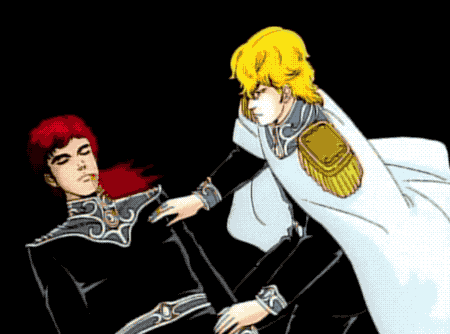

Back in episode 4, we were first introduced to Reinhard’s plan to gain enough power to rescue Annerose from the clutches of Kaiser Friedrich IV. Friedrich IV has since died of natural causes, freeing Annerose without Reinhard’s help. In episode 8, we learn that Reinhard’s ambitions extend to overthrowing the Goldenbaum empire, and then achieving supremacy over the entire universe—very specifically with Kircheis at his side. By the end of episode 26, Reinhard rules the empire in everything but name (the six-year-old Erwin Josef II still sits on the throne as Kaiser), but Kircheis is dead, rendering Reinhard’s longtime goal of joint conquest impossible.

For practical purposes, this barely matters: Above, Kircheis uses some of his last remaining energy to beg Reinhard to follow through with the plan they made together, in effect guaranteeing that he will continue on the same path after Kircheis dies. But in more abstract terms, both of Reinhard’s main reasons for seeking political power are now gone. And with a promise to the dead Kircheis as Reinhard’s driving force, Empire-side LoGH has suddenly become a very different show—one that is no longer about a man trying to conquer the universe, but is rather about a man searching for something to hold onto in a universe that, without Kircheis in it, seems to have very little to offer.

Annerose
But Reinhard shouldn’t feel entirely alone in the universe. After all, he has his sister, right? Well, not exactly. As Reinhard learns after Oberstein breaks the news of Kircheis’s death to Annerose (against Reinhard’s wishes), Annerose has decided now is the perfect time to do something really, really cruel: cut off contact with her grieving brother.
Reinhard’s Family
That the season 1 arc of Reinhard and Annerose’s relationship ends on a bad note is frankly an understatement, but to really dig into how things stand between them in episode 26, we must first get a handle on all the moving parts that brought them to this point.
Over the course of my season 1 posts, I’ve mapped out much of the dynamic between Reinhard and Annerose: Reinhard, who both idealizes and idolizes his sister, does so (unwittingly) at the expense of her personhood; Annerose, whose agency has been violently denied her since an early age, projects a portion of her (natural) resentment onto her brother, who moves freely about the universe steadily gaining power while her life remains stagnant. One aspect of their relationship that I haven’t examined, however, is the extent to which Annerose has played a parental role in Reinhard’s life.
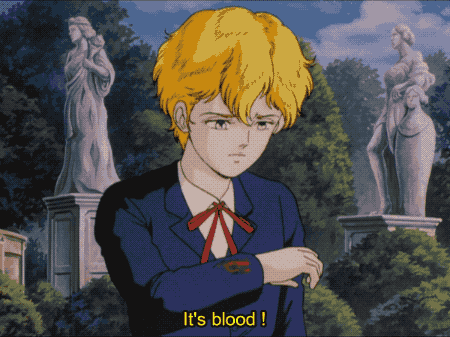
In this scene from the episode 4 flashback, Reinhard assigns to Annerose the kind of responsibility for his behavior that would ordinarily be reserved for a parent or guardian.

And then, after Reinhard and Kircheis have conspired to keep Reinhard’s misdeeds from his sister, Annerose puts their wet clothes in the laundry and dotes on them with hot chocolate and freshly baked pie. This is maybe the most archetypal depiction of motherhood I’ve ever seen, despite the fact that Annerose is both 1. actually Reinhard’s sister and 2. only five years his senior.
Reinhard’s father, who sold Annerose into sexual slavery at the age of fifteen, is obviously awful. And Reinhard’s mother, who hasn’t even ever been mentioned, clearly never had much of a presence in Reinhard’s life. Annerose is the only person (besides, eventually, Kircheis) we ever see taking responsibility and caring for Reinhard.
Reinhard’s family, as it is presented to us, is comprised of three people: himself, Annerose, and Kircheis. Though Kircheis is literally never (not once in all of LoGH!) referred to as being “like a brother” to Reinhard, their constant companionship since a young age means that their interactions often blur the line between surrogate-familial and romantic. The fact that Reinhard always brings Kircheis with him on visits to Annerose, for example, indicates that he at least views the three of them as a tight-knit unit.
But in Reinhard’s chosen family, there is a clear delineation of roles between Annerose and himself/Kircheis. In the gif above, Reinhard and Kircheis sit across the table from Annerose, who acts like a parent not just to Reinhard but to Kircheis as well; the difference in age and maturity between them is underlined by both Annerose’s matter-of-fact competence and Reinhard and Kircheis’s unashamed (and matching) nudity.

The photo that Kircheis gazes at in episode 25 (which eventually shows up in Reinhard’s locket, discussed later in this post) also draws a solid line between Annerose—who is more than a full head taller than the boys—and Reinhard/Kircheis. Kircheis’s sideways gaze at Reinhard serves to emphasize even further that they are a discrete pair.
Reinhard’s behavior towards Annerose starts to make more sense once you realize that he basically considers her his mother. Just as children tend not to understand—sometimes well into adulthood—that their parents are fully formed, flawed human beings with rich inner lives, so Reinhard has kept Annerose on a pedestal, treating her more like a symbol than a complex person. This also explains how Reinhard can, for example, be so blasé about teasing Kircheis in front of Annerose for his love of her cooking: Naïve as he is, the idea that Annerose might have feelings for Kircheis that go beyond platonic and motherly would never occur to Reinhard in a million years—unless something were to happen that brought Annerose’s feelings into stark relief.
Annerose Makes Up Her Mind
Which brings us back to the scene at hand, Kircheis’s death being the exact sort of cataclysmic event that might throw a wrench into Reinhard’s precarious relationship with his sister. And the second Annerose opens her mouth to speak, Reinhard knows something is wrong:

Annerose’s tone of voice here is as cold and distant as what she’s actually saying; rather than sharing in or sympathizing with Reinhard’s grief, she isolates him in it, trivializing his feelings of loss while also—by implying Kircheis was the only person Reinhard could ever care about losing—calling into question the authenticity of his devotion to her.
If Reinhard had been aware of all the little signs of Annerose’s resentment towards him that have been building up over the course of the last 25 episodes, this conversation might have gone differently—not because Annerose would have done a better job playing the part of the soothing sister/mother, but because Reinhard might not have been expecting her to. But Reinhard is naïve, especially about Annerose, so her abrupt switch from passive aggression (which Reinhard of course never picked up on) to overt hostility shocks Reinhard into a realization.


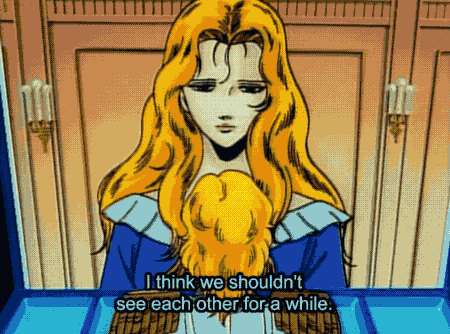

Above, Reinhard first protests Annerose’s disingenuous declaration that he has nothing left to lose, and then looks on in horror as it becomes clear that she intends to make it a true statement. But even while Reinhard listens, and responds, the gears are (visibly!) turning in his head, trying desperately to figure out what the fuck is going on. So let’s join him: What the fuck is going on?
First and foremost, I think, is Annerose’s desire for freedom. With Kircheis gone, she must realize that Reinhard’s need for her emotional support will increase astronomically. It’s one thing for her to live quietly in Reinhard’s mansion when he’s usually off gallivanting around space with his boyfriend; it’s quite another thing to share a home with someone who is grieving the loss of, as Mittermeyer so eloquently put it, half of his own self.
Because Reinhard may view Annerose as a mother, but that isn’t how Annerose views Annerose. We don’t actually know how she views herself—as I said back in episode 1, our entire characterization of Annerose is a reflection of how the world sees her—but we do know how she came to be Reinhard’s mother figure and, like her sale to Kaiser Friedrich IV, it wasn’t through any choice of her own.
In fact, this choice, the one to tell her grieving brother to fuck off so that she can finally get some time and space to herself, is the first choice we’ve ever seen Annerose make. So despite episode 26 ending on a catastrophic note for Reinhard’s relationship with Annerose, it ends on something of a triumphant note for Annerose herself: In choosing not to allow her well-meaning brother to use her as his personal grief counselor, she has finally, if perversely, reclaimed her agency.
Meanwhile, Reinhard has come to a completely different realization about Annerose’s motives:

My much earlier promise of a love triangle between Reinhard, Kircheis, and Annerose has finally come to fruition in true LoGH fashion, i.e. as morbidly as possible.
Make no mistake: The reason Reinhard asks this question of Annerose now is because it has never occurred to him before, and the reason it has occurred to him now is because Annerose is behaving in a way that he interprets as some mixture of jealous, vindictive, and heartbroken—none of which align with his image of his sister. Faced with her unambiguous and uncharacteristic cruelty, Reinhard searches around for an explanation and comes up with what would have sounded outlandish to him until this moment: romantic love.
But was Annerose in love with Kircheis? I don’t know. Frankly, I doubt Annerose knows (and we never get to see her answer, if she even gives one). Remember, Kircheis was ten years old to Annerose’s fifteen when she became the Kaiser’s concubine, meaning for most of the time they actually spent together, Annerose was basically Kircheis’s babysitter. It’s certainly possible that she developed romantic feelings for him over the years, or at least projected some romantic ideal onto him that she experienced as love. Given that he was probably the only male figure in her life besides her brother who was ever kind to her, it wouldn’t be surprising.
As a rival to Reinhard, though, my guess is that Annerose never considered herself in the running—and if anything, that would have made Kircheis an even safer object of affection for someone whose real-life experience with men was limited to a decade of blatant sexual exploitation. But that certainly doesn’t preclude jealousy or heartbreak; in that sense, Reinhard might be partially right about why Annerose chooses to act the way she does.
The accuracy of Reinhard’s suspicions, however, isn’t particularly important. What matters is that Reinhard has had this realization at all: In yet another twisted triumph for Annerose, and at immense cost, her brother has finally realized that she’s human.
Queerness
Given the reasons for the existence of this blog, it’s only fitting that we end our first season with a discussion of how LoGH treats queerness. Conveniently, this coincides with the creative team’s decision to convert a substantial portion of the show’s queer subtext into explicit text, done via multiple perspectives and narrative techniques throughout the season finale.
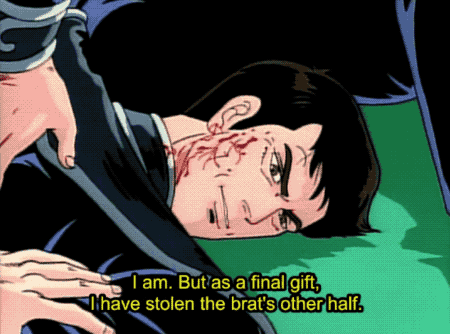
Our first open acknowledgement of the romantic nature of Reinhard and Kircheis’s relationship comes, unfortunately, from Kircheis’s murderer, Ansbach. The phrase “other half,” unlike much of the language used thus far to describe Reinhard and Kircheis, doesn’t have a heteronormative surface reading.
Incidentally, Ansbach’s easy familiarity with the concept of a romantic partnership between two men has always been one of the things that made me wonder about his feelings for Braunschweig—along with the fact that immediately after this, Ansbach tells Braunschweig to “wait for him in Valhalla” before killing himself.
Kircheis’s last words, too, work to remove a layer of heteronormativity from LoGH’s surface reading, albeit more subtly:

In this final, stunning example of a Reinhard-Bechdel Test failure, Kircheis uses his last breath to ask Reinhard to tell Annerose... that he kept his promise to be a good friend to Reinhard.
In a heteronormative piece of media, when a male character brings up a female character’s name in his dying breath, one would probably expect him to declare his undying love for her. That Kircheis starts his last sentence with “Please tell Lady Annerose...” and finishes it with a positive allusion to his relationship with Reinhard is an incredible subversion of heteroromantic tropes. It even goes so far as to “straight-bait,” dangling the possibility of Kircheis’s romantic feelings for Annerose in front of the viewer before categorically dismissing it.
Later, while Reinhard mourns, Mittermeyer uses similar language to Ansbach’s, above, to explain to Müller why Reinhard is in such an inconsolable state:

Like Ansbach’s usage of “other half,” Mittermeyer’s “half of his own self” doesn’t have a non-romantic interpretation to bolster LoGH’s increasingly shaky heteronormative surface reading. Also like (maybe) Ansbach, Mittermeyer is a character who (as we’ll see much more of soon) can speak from his personal experiences with queer romance, making him perfect for delivering this unambiguous message not just to other characters, but also to the viewer.
The last scene of the episode and the season finds Reinhard at Kircheis’s grave which, yet again, emphasizes his romantic relationship with Reinhard, and not just because of the inscription’s use of the singular possessive “my”:

Though the German “Mein Freund” directly translates to “my friend,” that isn’t actually how the phrase is used in Germany, where “Mein Freund” most frequently refers to a male romantic partner. The only ambiguity about Kircheis’s inscription is in how it’s translated: as わが友 in Japanese or, literally, “my friend,” obscuring the German usage and allowing it to continue to pass as heteronormative.
After placing flowers on Kircheis’s grave, Reinhard sits back, revealing that he has started wearing a locket. Opening it, he shows us that it contains a photo we’ve seen before of Reinhard with his chosen family, and a lock of Kircheis’s hair:

Season one of Legend of Galactic Heroes ends on a deeply personal note, and it also ends on a series of questions: What, or who, will Reinhard find to fill the gaping hole in his life left by Kircheis’s death? Will it be his rivalry with Yang? Other, darker questions are left unspoken, but their presence is felt nonetheless: Will Reinhard find something to “quench the thirst in his heart”? And, if not, what then?
Stray Tidbits
During this post, as usual, I’ve used gifs from the LD (original) versions of LoGH instead of their redrawn versions. Episode 26 was almost entirely redrawn, and many of the “remastered” scenes are dramatically different from their original versions, so I’m gonna give a few sample comparisons here. Kircheis’s death scene, for example, was changed to make his physical process of dying appear significantly less grisly. Below, on the left, the redrawn Kircheis’s body is still and his eyes are focused on Reinhard; on the right, the original Kircheis’s breaths are visibly laborious and painful, and his eyes are unfocused:


Below, Reinhard’s facial expressions and reactions during his conversation with Annerose were changed so drastically that he might as well be a different character. In the redraw (left), Reinhard is practically throwing a tantrum; in the original (right), Reinhard is still shocked, but keeps his composure as he struggles to process his sister’s unexpected cruelty, placing the emphasis squarely on his thoughts rather than on his feelings:

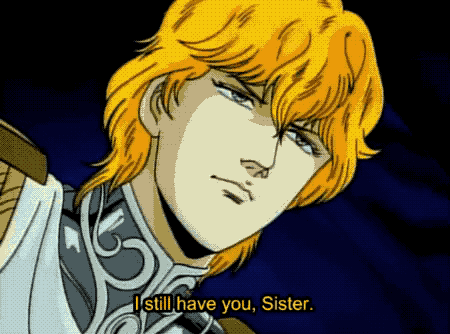
On a lighter note, the redraw team seems to have been confused (or, less charitably, offended) by this public display of intimacy between Reuental and Mittermeyer—in the redraw (left), Reuental stops Mittermeyer from standing by either touching his hand or just making a motion as if to touch his hand, keeping a respectful distance; in the original (right), Reuental physically impedes Mittermeyer from standing up by placing his hand on *draws a diagram* his very inner thigh, and leaving it there:


A small worldbuilding note: The dates on Kircheis’s grave are wrong! He was actually born in 467, not 468, according to every other marker of time in the LoGH universe.
And now for something extremely disturbing: An official LoGH-branded Kircheis roomba exists. When it’s low on batteries, it says, “I won’t be able to serve you anymore, Reinhard-sama.” Sadly, this is real and I’m not making it up.
#Legend of Galactic Heroes#Legend of the Galactic Heroes#author: Elizabeth#Empire#Reinhard#Kircheis#Annerose#Reinhard-Bechdel Test#queerness#family#holding hands#redraws#quote unquote friends#ow
52 notes
·
View notes
Text
Episode 23: The Fall of Goldenbaum

September 797/488. After a riot on Westerland leaves his nephew dead, Braunschweig decides to take the rather drastic measure of nuking the small planet’s entire population out of existence. This leads to the sinister Oberstein’s most sinister plan yet: Instead of stopping the Westerland attack, why not send a probe to record it and broadcast evidence of Braunschweig’s atrocities throughout the Empire? Reinhard’s tentative objections can’t stop Oberstein from lying to accomplish his goals, so the Westerland attack is carried out, the footage is broadcast, and Reinhard wins popular support and the civil war. Meanwhile: Ansbach, swearing revenge against Reinhard, forces Braunschweig to do the Honorable Thing and drink poison; Reinhard’s admirals save the Empire’s art collection; and Annerose gazes wistfully over a balcony.
Westerland

We’ve been given numerous warnings about Oberstein ever since he forcibly introduced himself to Kircheis back in episode 4, and guess what: In episode 23, shit finally hits the fan. No, Oberstein isn’t the one who planned and executed the attack on Westerland, but—well, actually, let’s go ahead and break down who exactly was responsible for what, because this will in fact be on the exam:
Person of Interest 1: Braunschweig

Braunschweig personally ordered a nuclear attack on Westerland, killing 2 million innocent people. He is obviously the worst and guiltiest party. Moving on.
Person of Interest 2: Oberstein

When Reinhard's instinct was, of course, to swoop in and save Westerland from Braunschweig’s attack, it was Oberstein who suggested allowing the attack to happen for Reinhard’s political gain. That’s fucked up, Oberstein!

Reinhard was rightfully scandalized at first, but he’s long been susceptible to Oberstein’s simple and effective brand of Machiavellianism, so he put off his decision until the last minute, which Oberstein told him was six hours away.

Oberstein then ordered Ferner to follow through with his plan despite Reinhard’s misgivings, in the process revealing to us that he had lied to Reinhard about how much time he had to make up his mind. Oberstein: He truly does suck.
Person of Interest 3: Reinhard

In a one-episode vacuum, Reinhard is almost blameless for the Westerland massacre: We don't know if he would have decided to side with Oberstein, or with his own conscience (and, presumably, Kircheis’s), had Oberstein decided not to be a duplicitous fuck. Outside the vacuum of this single episode, however, Reinhard is far more culpable. After all, he hired Oberstein, despite Kircheis’s warnings, under the naïve assumption that he could rein him in. More on this shortly.
Reinhard and Oberstein
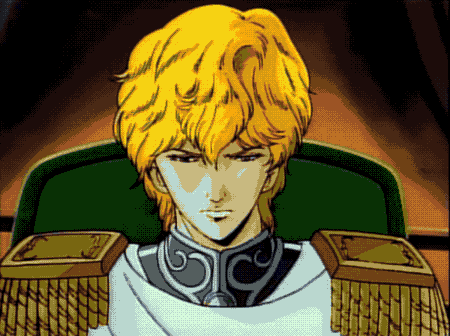
The word Reinhard uses here, 許す (yurusu), can mean either “forgive” or “permit,” so both the fansubs (left) and the official subs (“If you were here, you’d never, ever allow me to do this”) are valid interpretations, despite having different meanings.
Okay so are we all clear on who did what? Good. We’ll come back to that, but for now let’s fast forward a bit to the aftermath of the attack, at which point Reinhard, defying all earthly logic, finds out that Oberstein lied to him and decides not to punish him for it.
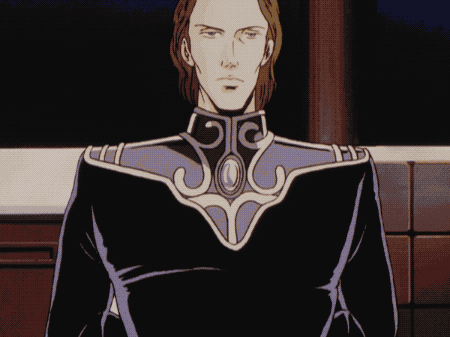
Maybe I’m just being optimistic, but it’s moments like these, in which Reinhard appears completely blindsided by the fact that Oberstein went behind his back, that make me think that if he hadn’t been lied to, Reinhard would have stopped the Westerland attack. Oh well.
The last time one of his subordinates flat out disobeyed him, Reinhard was so furious that Kircheis had to lecture him on the importance of leniency—and Bittenfeld’s transgressions were nowhere near as bad as Oberstein’s. So why does Reinhard not only refrain from taking action against Oberstein, but listen to his bullshit rationalizations after the fact?

Watch as Oberstein does a live performance of the dictionary definition of “refusing to take responsibility for your own damn actions, Oberstein.”
Since Reinhard hired (acquired? bought?) Oberstein, there have been very few times when they’ve disagreed enough for Reinhard to put his foot down. The only real exception has been the subject of Kircheis’s special privileges and “number two” status, on which Reinhard has (so far) been unwilling to budge.

Reinhard is far more uncomfortable with the fact that he is unable to convince Kircheis that Oberstein is an asset to their team than he is with Oberstein himself—to a point.
To be fair to Reinhard, Oberstein has, until now, refrained from recommending a course of action that was unequivocally evil—both to Reinhard’s mind and to Kircheis’s. His plans may have been morally ambiguous, but they were still at least on some level redeemable: Not only could Reinhard rationalize directing his subordinates to follow Oberstein’s recommendations, but Kircheis could rationalize turning a blind eye (sometimes literally) to Reinhard’s increasing reliance on such an openly morally grey character.
With Westerland, this changes. Oberstein’s suggestion that Reinhard allow the attack to take place is the first time we see Reinhard balk at a non-Kircheis-related proposal from his staff officer, and is therefore also our first chance to see if Reinhard really can, as he promised Kircheis back in episode 8, stand up to Oberstein. At first, it seems like he might:

Reinhard is obviously and viscerally repulsed by Oberstein’s cool utilitarianism here, and though Oberstein pushes him hard on it, Reinhard doesn’t back down from his insistence that he have time to decide on whether or not to exploit the attack for his own gain.
In the end, of course, we don’t get to find out for sure what Reinhard would have chosen to do, because Oberstein goes ahead without his knowledge. But Reinhard still has another shot to prove that Oberstein isn’t pulling his strings: Even if it’s too late to save Westerland, he could remove Oberstein from his position as Reinhard’s chief advisor (after Kircheis), thus preventing more Westerland-like fiascos in the future. But he doesn’t.
It makes sense that Reinhard would avoid the public, political spectacle that might result from court-martialing Oberstein; at worst, this could lead to popular opinion painting him as both complicit in the Westerland attack and incompetent. However, some form of discreet, private censure seems like it would be easy enough to do without attracting much attention. Unfortunately for Reinhard, there are other, less tangible obstacles standing in the way of not letting Oberstein walk all over him.
First of all, Oberstein is fucking terrifying. This isn’t as important a consideration as the next obstacle I’m going to talk about, but it’s worth mentioning that the man Reinhard would theoretically be up against just proved that he’s willing to allow an entire population of 2 million innocent people to be brutally murdered to achieve his goals.


Until now, Reinhard’s commanding presence has been a dominant aspect of his characterization, especially when it comes to anything related to war: Above on the left (from episode 14), Reinhard leads his staff in a victory toast before he’s even won; while on the right (from episode 15), his harsh words for Bittenfeld’s actions cause a low-ranking officer to visibly cower. It’s not surprising that Reinhard, whose primary goal in life is literally to conquer the universe, projects confidence that often crosses the line into arrogance.
But this is in stark contrast to his subdued affect following the revelation that Oberstein went behind his back vis-à-vis Westerland:
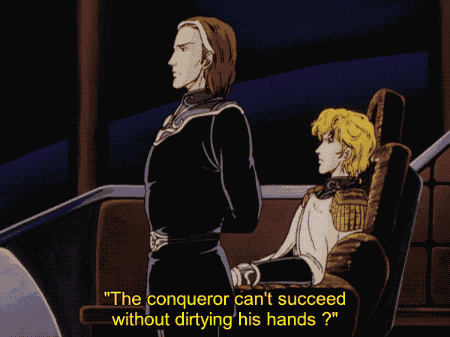
Reinhard seems trapped during this whole scene, unhappy and yet—for the first time that we’ve seen in a military setting—without the power to act. Unlike his usual fearless, imperious self, post-Westerland Reinhard has the disconcerting air of a cornered animal.
Of course, Reinhard’s fear is (or should be) moot, because he isn’t a cornered animal—he’s an Imperial marshal with a cadre of talented and loyal subordinates who would deal with The Oberstein Problem as soon as Reinhard said the word, if he ever did. Which brings me to Reinhard’s second and far more dangerous intangible obstacle: his pride.
From the moment that Kircheis first voiced his concerns about Oberstein, Reinhard has treated him like more than a mere staff officer; faced with the possibility that Oberstein might be too much for him to handle, Reinhard promptly turned him into a symbol of his belief that, in fact, nobody is too much for him:

In this moment from episode 8, Reinhard is essentially betting Kircheis that Oberstein won’t do the exact sort of thing that he ends up doing in episode 23. The bet is, of course, one-sided—Kircheis has no interest in proving Reinhard wrong; he just wants Oberstein to stay the hell away.
In order for Reinhard to censure Oberstein, he would first have to admit that Oberstein deceived him in such a way as to cause the deaths of 2 million people. And the enormity of Oberstein’s crime would reflect the enormity of Reinhard’s failure not only to control Oberstein in this one instance, but also to have the foresight to see what was coming—which Kircheis did, unlike him.
In short, Reinhard is too proud and too stubborn to admit that he’s in over his head, and was wrong about Oberstein. And without a willingness to ask for help shouldering the burden of Oberstein’s treachery, the fact that Reinhard has a team of handpicked and distinguished admirals at his disposal is irrelevant. He’s alone, and faced with the prospect of no support in a fight against Oberstein, he gives in.

An obvious drawback of Reinhard keeping his fears and concerns secret: Anyone who puts two and two together is going to assume the worst. Luckily, he has Kircheis to argue for giving him the benefit of the doubt—at least until he can confirm or deny the rumors for himself.
Stray Tidbits
Reuental and Mittermeyer holding their hands in identical positions as they walk past the disgraced nobility is such a good detail—the animators absolutely never miss a chance to show us how fucking in sync these two are. Damn.

And here is another nice bit of LoGH’s trademark consistent characterization, in which Artist-Admiral Mecklinger rallies the troops to... save the Empire’s art collection? Yes. A very soldierly activity. I love how enthusiastic and serious they all are.

Okay so it looks like Ansbach’s feelings in Braunschweig’s direction are less of a comparison with Kircheis’s and more of a foil for them. Ouch. Rest in pieces, Braunschweig.

In less unsavory news that somehow still relates to men swearing undying loyalty to one another, Merkatz and Schneider are going to the Alliance! And as another contrast with the fucked up retainer/vassal relationship between Braunschweig and Ansbach, Schneider proposes that he and Merkatz defect together only after keeping him from committing (honorable) suicide. What a precious young man! I wish these two nothing but the best. Bon voyage!

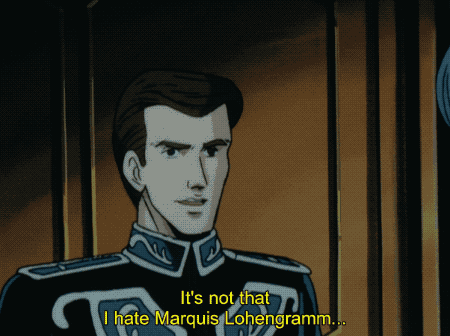
#Legend of Galactic Heroes#Legend of the Galactic Heroes#author: Elizabeth#Empire#Reinhard#Westerland#Oberstein#Kircheis#pride
21 notes
·
View notes
Text
Episode 20: Bloodshed in Space

797/488. Reinhard sends Mittermeyer to kick the asses of some extremely whiny nobles, which he does with aplomb. Later, Reinhard sends Mittermeyer and Reuental together to... well, to attempt to kick the ass of Ovlesser, a significantly more threatening noble. Tensions mount among Braunschweig’s team, particularly between Merkatz and everyone else (save Schneider, of course). Reuental and Mittermeyer succeed at capturing Ovlesser, after much frustration and at great cost. Despite everyone else’s desire for revenge, the sinister Oberstein convinces Reinhard (and Reuental and Mittermeyer) to let Ovlesser go; as Oberstein predicts, Ovlesser’s comrades-in-nobility interpret his return as meaning that he betrayed them in some way, and he is unceremoniously executed as a traitor. Chalk up another win for Oberstein’s fucked up plans! Meanwhile, Mittermeyer makes moon-eyes at Reuental, and Ferner enjoys carrying out Oberstein’s plans a little too much imo.
Reuental and Mittermeyer

Reinhard and Kircheis are great and everything, but Reuental and Mittermeyer are the greatest love story of all time. I’m not biased.
(From “My Conquest.”)
I promised early on that eventually, Reuental and Mittermeyer’s relationship would stand alongside Reinhard and Kircheis’s as one of LoGH’s two epic love stories. Sadly, Reuental and Mittermeyer have had very little screentime up to this point, so I haven’t had much reason to talk about them for longer than to remind you that yes, they did go on a date this episode, thank you very much. Until now! Finally, in episode 20, Reuental and Mittermeyer take center stage, which makes now the perfect time to dig into their presence on the show so far.
Synchronization
When it comes to battle, Reuental and Mittermeyer are a well-oiled machine. We’ve seen them consult with each other before and after fleet battles; we’ve also seen them work together fluidly in hand-to-hand combat, without the need to consult at all:

In episode 11, Reuental and Mittermeyer invite themselves to help Kircheis rescue Annerose and, upon encountering a bunch of Benemunde’s cronies, take the lead in taking them down. Notice how Mittermeyer and Reuental claim their respective quarries by assigning them to each other, rather than to themselves, underscoring their affinity.
Above, Reuental and Mittermeyer communicate in a kind of shorthand: Rather than speaking directly about their plan, they talk around it, with the implicit assumptions not only that it’s already been decided save the details, but also that they both know what it is. And unlike the dynamic between Reinhard and Kircheis, who also have their own non-verbal methods of communication, neither Reuental nor Mittermeyer is subservient to the other: Both have an equal say and exercise their right to express that without hesitation.

Sorry Kircheis, this may be your fight, but it’s way more important for the audience to understand that Reuental and Mittermeyer are equals than it is for you to get to sit in the front seat. Maybe next time!
(From episode 11.)
We see this dynamic play out again in episode 20, when Reinhard sends Reuental and Mittermeyer to take down the bloodthirsty High Admiral Ovlesser. When the original plan to overwhelm him with battle-axe-armed infantry fails miserably (and violently, so, so violently), Reuental and Mittermeyer decide to go in themselves as bait—which all seems perfectly normal until you realize that they never actually discussed this plan out loud.

Just like the show’s audience, the aide standing literally right next to Reuental and Mittermeyer had no idea what their plan was until they both started talking about it simultaneously. In both a subtler and a more literal interpretation of Reinhard’s “Kircheis is the same as myself,” Reuental and Mittermeyer nonchalantly operate as if they share the same actual brain.
When they do eventually succeed at trapping Ovlesser, the battle-harmony between Reuental and Mittermeyer is even further emphasized, this time with some clever camerawork:

Mittermeyer kicks away Ovlesser’s axe, at which point the camera is behind his legs; then he turns around and... wait, it’s Reuental?! How did they do that?
Mittermeyer and Reuental have been acting as one all this time, but here the camera goes a step further and treats them like one physical body. Even when Reuental and Mittermeyer aren’t occupying space together on the screen, LoGH’s creators want to make sure we interpret them as two halves of a whole. This is a lot more than just a throwaway cinematic trick.
Body Language
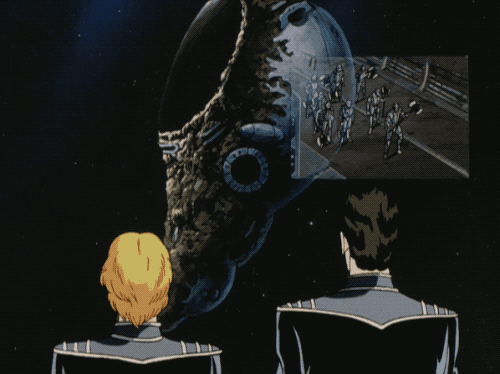
In the absence of expository flashbacks, the characterization of Reuental and Mittermeyer’s relationship is conveyed to us mainly via their (present-day) physicality. And the way they move when they’re onscreen together is unique to them, a visual representation of a type of intimacy we don’t see with the relationships between any other characters.
The gif above, in which Reuental and Mittermeyer sigh in unison, is a straightforward but striking example of how precisely their movements are choreographed to match one another. Mittermeyer leans his head slightly forward; Reuental leans his slightly back; the amount of negative space between them stays exactly the same the whole time, just shaped a little differently. Without mimicking each other’s positions, Reuental and Mittermeyer manage to give the impression of perfect balance. It’s a kind of approximate visual symmetry that’s both very expressive and very satisfying to watch—and we’ve been watching it, in fact, since “My Conquest.”

Like with their sighs above, here Reuental and Mittermeyer move in tandem—but instead of keeping the negative space between them the same, they move into it equally, so it becomes smaller but stays symmetrical. Also: Note the complementary head-tilts.
(From “My Conquest.”)

In many of these scenes, the camera itself remains static, allowing Reuental and Mittermeyer to be the only movement in the frame so the viewer can focus on how they fill a space together. In this moment from episode 5, the completely symmetrical background contrasts with how Reuental and Mittermeyer both reach subtly into the other’s “half” of the screen before settling against the balcony.
Not even the fact that Mittermeyer is several inches shorter than Reuental can get in the way of their visual balance—above, for example, Mittermeyer walks slightly ahead of Reuental, so his time in the center of the screen is longer. Below, Mittermeyer brims with energy and dynamism while Reuental is still as a statue until he expresses his restrained but emphatic agreement:

Mittermeyer’s physically asserted rage allows him to take up more space than his smaller stature would allow on its own, while Reuental, like Kircheis (usually), reins himself in. Taken together, they again balance each other out.
This isn’t the first time we’ve seen a couple’s dynamic encapsulated in how they move to fill the screen. In fact, the contrast with Reinhard and Kircheis’s framing helps reveal how carefully the animators worked to portray Reuental and Mittermeyer as equals:

The great thing about this moment from episode 4 is how strikingly out of balance Reinhard and Kircheis are while still using the same visual language of approximate symmetry that is used for Reuental and Mittermeyer. Kircheis literally struggles to catch up and be close to Reinhard, crawling back into the screen when Reinhard drags himself away—there’s symmetry here, but not equality.
When you combine all these elements—the give-and-take, the use of negative space, the slightly uneven but somehow perfectly balanced movement—you end up with scenes like the one below, in which Reuental and Mittermeyer discuss their aforementioned (and silently agreed upon) plan to ensnare Ovlesser. It’s a scene that is so casually well-choreographed that it is truly a wonder to behold:
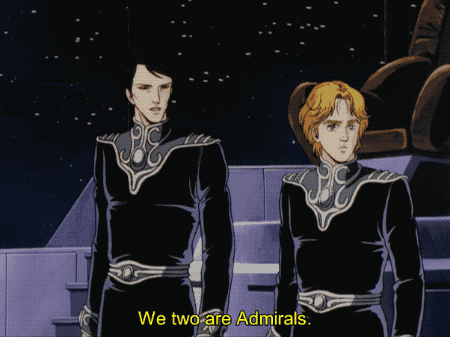
Looking at this gif fills me with a quasi-religious ecstasy. It’s perfect.
Above, Mittermeyer, who waits a beat before responding to Reuental’s movements, shifts his stance into the negative space that Reuental has just vacated, which keeps their bodies aligned. Mittermeyer puts his hands on his hips (a favorite position for him), and Reuental follows by putting his behind his back, so the space their bodies occupy is symmetrical but their postures are not. Mittermeyer waits for Reuental to put his openly gesturing hand away before putting both of his up; and through it all Mittermeyer is affectionately watching Reuental’s face while he describes their plan to someone offscreen.
At this point in LoGH, we still know next to nothing about who these two ridiculously handsome and distinguished admirals are. But if we pay attention to how their bodies interact on screen, we can begin to piece together who they are to each other. With Reuental and Mittermeyer, that’s a really good place to start.

Then again, sometimes you don’t have to pay attention beyond the embarrassingly fond expressions these two wear whenever they look at each other. Seriously this moment makes me blush.
(From “My Conquest.”)
Ugh, More Character Redraws
I regret to inform you, dear readers, that the fiends behind LoGH’s cursed “remastered” character redraws are back at it again, and this time, it’s personal:

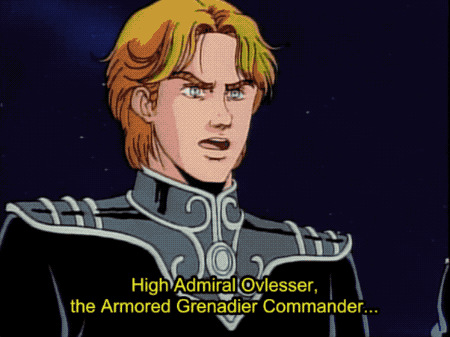
Of all the characters who suffer from redraws—and nobody is safe, NOBODY—Reuental truly has it the worst, because the changes made to his expressions venture into character assassination territory. Above, you can see a perfect example of how Reuental’s demeanor was completely altered (on left) from how he was originally animated in the LaserDisc version (right). On the LD, Reuental learns who is guarding the passage he is to infiltrate with Mittermeyer, and he is visibly concerned. In the remasters, his apprehensive frown is flipped into a smile that says: “I’m not the kind of person who would worry about all the troops under my command who are probably about to get killed!”
This is far from the last time we’ll see Reuental’s character hardened like this, and I promise I will point out EVERY SINGLE INSTANCE, because Reuental was originally drawn to be a lot warmer, gentler, and more human than the redraws would have you believe. It should go without saying that this is a pretty significant change, and one that has the potential to affect one’s interpretation of Reuental (and of Mittermeyer) a great deal—it should also go without saying that when there are big differences like the one above, I’ll be analyzing (and embedding gifs of) the original LD versions.
Stray Tidbits
I'm honestly so impressed with the visual shorthand for "awful" that the animation team uses to describe the Imperial nobles. It basically comes down to nothing more than their hair and facial expressions, but the overall impression is that they sure are a bunch of fancy little boys.

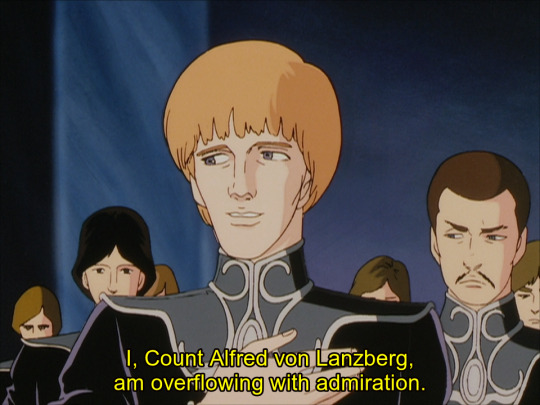
My first impulse is that Ferner needs to calm the fuck down for two seconds, but on the other hand, I guess I’m glad he has an acceptable outlet for his weird urges?

Besides war, drinking, and going on dates with Reuental (which usually involve drinking), Mittermeyer’s favorite hobby is roasting Bayerlein. Seriously every time Bayerlein tries to get in Mittermeyer’s good graces in some way, Mittermeyer shuts him down spectacularly. It’s incredible. I don’t know what Mittermeyer’s problem is but I’m not complaining, I mean look at that side-eye/eyeroll hybrid!

Mittermeyer is so good at war that he gave this guy an ulcer that almost killed him. Sure, I buy it.
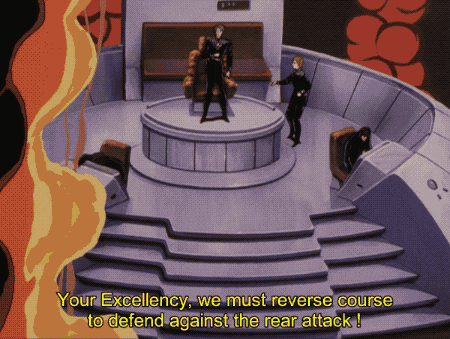
I’ve gotten a lot of mileage out of this gif, so now I offer it to you, humble reader. Go forth and use it well.

#Legend of Galactic Heroes#Legend of the Galactic Heroes#author: Elizabeth#Reuental#Mittermeyer#Empire#body language#redraws#Reuental deserves better#Oskar Meyer#that's the proper R/M pairing name#long-suffering Bayerlein
26 notes
·
View notes
Text
Episode 16: A New Tide

Fall 796/487. The Battle of Amlitzer Starzone wraps up as a big win for the Empire and a big loss for the Alliance—though not for Yang’s fleet, which is able to escape mostly unscathed. Reinhard decides to punish Bittenfeld for fucking up royally, but Kircheis convinces him not to, much to the sinister Oberstein’s chagrin. Then, twist! The Kaiser dies of a heart attack! There’s no direct male heir, so a bunch of vaguely related randos jockey for position before it’s decided that the throne will be awarded to Frederich IV’s grandson, the five-year-old Erwin Josef II. Over in the Alliance, Yang is appointed Commander of Iserlohn, where he immediately hires all his misfit friends and co-conspirators to help make Iserlohn the best party fortress in the galaxy. Meanwhile, Reinhard and Kircheis touch each other a lot (in the past and in the present), and Reuental and Mittermeyer, unable to go on a date during an actual battle, FaceTime instead. Annerose actually gets to be happy for once.
Reinhard and Kircheis
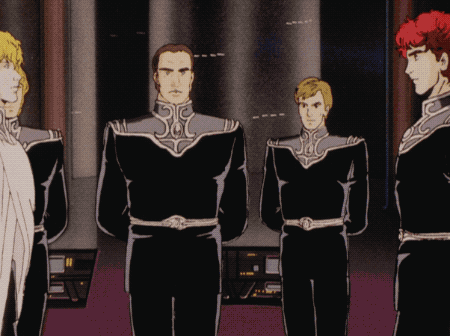
There is SO MUCH telling body language in this moment: their hands simultaneously reaching for each other, Reinhard’s lingering touch on Kircheis’s shoulder, Kircheis’s tiny head tilt down... It’s unfair that they can’t just kiss onscreen, isn’t it?
It’s been a couple episodes (and at least a few in-universe weeks) since our central couple have been in the same place at the same time, and you’ll recall they parted on complicated terms. But as has been the case in the past, Reinhard and Kircheis are nothing if not good at compartmentalizing. Kircheis may not approve of Reinhard’s Oberstein-inspired methods of late, but that doesn’t stop him from carrying out his orders to the letter and looking forward to a happy reunion. And Reinhard’s concerns about the tension between them at this point seem only to heighten his relief at Kircheis’s safe and successful return home.

Even during this period of uneasiness between the two of them, Kircheis’s mood at the prospect of seeing Reinhard again is unambiguously positive. And very sweet.
Of course, Reinhard’s public display of intimacy with Kircheis upon his return, however restrained, has the sinister Oberstein on edge, which only increases when Kircheis unabashedly follows Reinhard into his private quarters following his harsh reprimand of Bittenfeld.
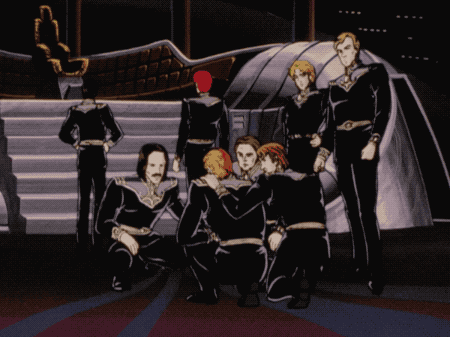
Mittermeyer clearly also notices Kircheis unsubtly walking after Reinhard, but he minds his own damn business. (That’s kind of Mittermeyer’s thing, as we’ll see much more of later on.)
But luckily for us, Kircheis cares about what Oberstein thinks exactly as much as is warranted (not at all), so he’s about to exercise some special privileges, and we get to watch.
Influential Kircheis
We’ve heard a lot about Kircheis’s ability to influence Reinhard—Annerose has encouraged it; Oberstein has been wary of it—but until now Kircheis has been almost entirely agreeable, even when he doesn’t agree. If he really does have significant sway over Reinhard, it seems like he’s been playing it pretty close to the vest. Actually, it turns out he’s just been saving up his Influence Reinhard Chips to spend on something worthwhile: what he sees as Reinhard’s callous treatment of a subordinate.
Whenever we get glimpses into the inner workings of Reinhard and Kircheis’s relationship, it’s worth an in-depth examination, and the episode 16 Bittenfeld conversation is a doozy, so get comfortable.
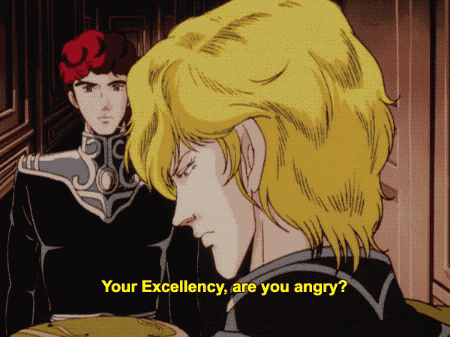
After his first request for Reinhard to reconsider his punishment of Bittenfeld is met with indignation, Kircheis abandons that line of inquiry and moves onto something less direct but more uniquely accessible to him: Reinhard’s emotions.
Yes, it’s a conversation about feelings! There are a few things about this whole scene that make it something only Kircheis can do—the setting, the straightforwardness, his eventual successful persuasion of Reinhard to his way of thinking—but the most pronounced is definitely its subject matter. It’s safe to say that, with the probable exception of Annerose, Kircheis is the only person in the entire galaxy who could initiate a conversation about feelings with Reinhard von Lohengramm and live to tell the tale.
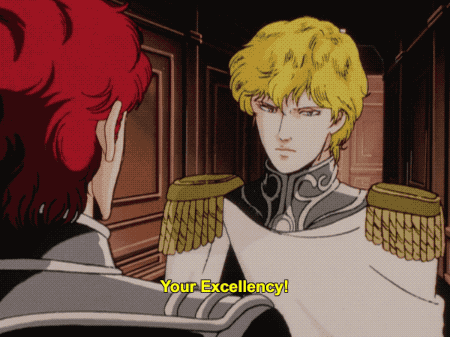
The trouble with dating in the workplace: Once Kircheis has made clear the level of intimacy necessary to having this conversation, Reinhard gets annoyed that he’s still using such an official form of address (kakka).
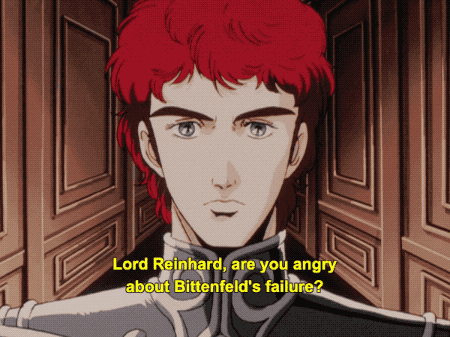
Of course Kircheis being Kircheis, the least formal address he can muster is Reinhard-sama, but here at Icebergs we don’t believe in kinkshaming. Let your freak flag fly, Kircheis!
Kircheis proceeds to perform some highly accurate armchair psychology on Reinhard, and posits that the true object of Reinhard’s anger is not Bittenfeld but (gasp!) Reinhard himself. This, of course, pisses Reinhard off but only because of how true it is, proving yet again that he is among the most relatable characters in LoGH.


Reinhard’s adorably self-contained mini-tantrum, above, fazes Kircheis literally not at all, which I find to be super touching—Kircheis says something that he knows will get under Reinhard’s skin, and then makes it clear that it’s safe for Reinhard to process that emotion openly in his presence. He’ll wait. Also worth noting is that, while Reinhard expresses anger and frustration in public quite frequently (as we’ll see far more of in the future), usually whoever is unlucky enough to be standing near him at the time becomes anything between wary and downright terrified, as can be seen in these moments from episode 15:


It’s to be expected that the random low-level officer above on the left would flinch spectacularly at Reinhard’s, um, amazing line there, but even the pathologically stoic Oberstein is not immune to standing slack-jawed in the presence of Reinhard’s fury. Kircheis, who has been Reinhard’s constant companion for a decade, knows what to expect from Reinhard and is not even a little bit afraid of him. I imagine Reinhard must find that very comforting.
When Kircheis gets to the point of why he followed Reinhard in the first place, he does finally lose his composure a bit—and for Kircheis, as I’ve discussed, a bit of lost composure goes a long way.
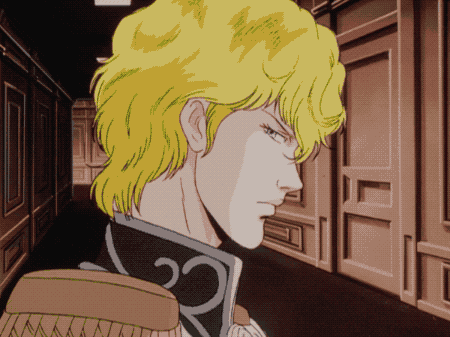
Kircheis’s general affect is one of carefully controlled size and strength. This is only the second time we’ve seen him lose his cool, and just like when he did in episode 9 (below), his impassioned movement fills the screen far more than his usual calmness does.

Emotionally unrestrained Kircheis can barely be contained by your TV screen.
Whether it’s his unleashed passion or his reasoning that does it, Kircheis is able to convince Reinhard, and after letting the anger flow through him for a bit, Reinhard calms down enough to admit that Kircheis is right, and he shouldn’t punish Bittenfeld. Reinhard starts to walk away, then turns back to ask Kircheis something, and we are blessed with what is definitely one of the top ten softest moments in all of LoGH:

Soft-eyes Reinhard is a gift among gifts, we are not worthy. This exchange is just so sweet and pure, I love these two boys.
Supportive Kircheis
Episode 16 is All About Kircheis... with respect to his relationship with Reinhard, of course. We’ve already seen how Kircheis is able to exercise his much-talked-about Influence Over Reinhard, and now it’s time to delve deeper into another aspect of their dynamic: Kircheis as emotional protector.
Given the toll Kaiser Friedrich IV has taken on Reinhard’s life, you might expect for him to be happy when the Kaiser suddenly drops dead of a heart attack, but this is Reinhard, so you’d be wrong. Instead, Reinhard is profoundly frustrated that he doesn’t get to deliver some kind of appropriately cruel killing blow himself against the man who bought Annerose ten years ago. Kircheis, too, is frustrated, but for a different reason.
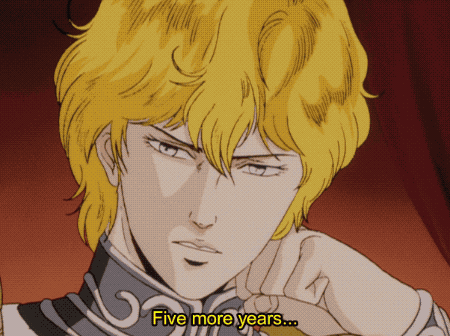
Kircheis’s nod here is ambiguous: At first glance he obviously agrees with Reinhard because of Annerose’s mistreatment at the hands of the late Kaiser. But his feelings are more complicated that that because, as always, he filters them through his feelings for Reinhard.
In response to Reinhard’s angry musings, Kircheis has a brief but frankly kind of incredible memory in which he fails the Reinhard-Bechdel Test so dramatically that I again feel kind of awful for intruding on what are clearly very private thoughts. Kircheis’s memory fills in an apparent blank in the episode 4 flashback, and is below basically in its entirety:
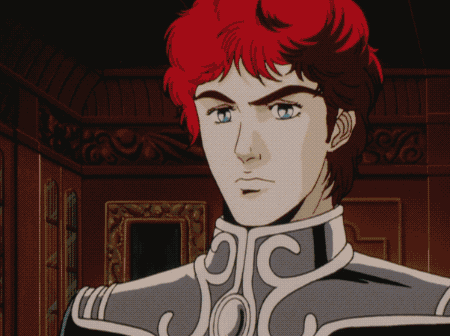

Contextually, it would make sense for Kircheis to be remembering the 15-year-old Annerose being taken away to become the Kaiser’s concubine—it’s what Reinhard was just talking about, after all. But Annerose only gets just enough screen time to confirm that yes, she’s the one in the car that Reinhard and Kircheis are chasing after.
Instead, both the camera and Kircheis are focused on how devastated Reinhard is. Kircheis doesn’t flash back to losing Annerose—he remembers supporting Reinhard (physically, even!) through the trauma of him losing Annerose. Of course Kircheis is angry at the Kaiser for what he did to Annerose: Annerose was basically family for the short time that they were neighbors, and besides, it was a really objectively fucked up thing that happened to her. But the emotion that shows on his face when Reinhard bemoans his missed chance to personally murder the Kaiser is not about Annerose; it is, as always, about Reinhard.

And when Kircheis accompanies Reinhard to his long-awaited reunion with Annerose, the camera again tells us what we already know: Kircheis’s emotions, conveyed via a close-up of his tear-filled eyes, are in response to Reinhard finally getting his sister back.
Iserlohn, assemble!
Meanwhile, elsewhere in the galaxy, people are actually having fun instead of being sad, angry, and vengeful. We’ll learn a LOT more about the ins and outs of life on Alliance-occupied Iserlohn, but suffice it to say that I (Elizabeth) want to live there, and specifically if anyone can figure out some way for me to go drinking at a gay bar with Dusty, I would ask that you please let me know.
Anyway, newly-minted Admiral Yang is now officially in charge of Iserlohn, so it falls to him to appoint all the usual suspects to important positions under his command—Dusty, Schenkopp, Frederica, and of course Poplan and Konev all get special mention.

Work it, Poplan!
Earlier in the episode, we see Yang and the, uh, gang seeing Cazellnu off at the airport—despite it not actually being his fault, he’s been banished to a remote frontier planet as punishment for the Alliance falling victim to Reinhard’s aggressive starvation tactic back in episodes 13 and 14—and Yang takes the opportunity to casually ask his friends to work for him in an official capacity when they get to Iserlohn.

We also see some great (as usual) Alliance streetwear, as well as Cazellnu’s wife, Hortence, who has finally blessed us with her presence. Rebecca is sure to talk more about her in the future. Possibly more than is strictly necessary.
There’s a nice little bit of exposition in the background of this scene that’s conveyed, like so much else in LoGH, through facial expressions: Listening to Yang start to fill out the roster of people he’s taking to Iserlohn, Julian’s face betrays his fear that he might not be among them.

This isn’t the last time Julian telegraphs his emotions to the viewer without saying anything, so make sure to keep a close eye on his expressions, especially when the camera makes a big point of it like it does here.
This potential drama is resolved off-screen, but seeing the worry on Julian’s face at the airport makes the reveal that he did get to come along after all a really sweet moment.

Julian and Gensui are ready to be photographed for the Winter 796 Sears Christmas Catalog cover.
Stray Tidbits
What the hell kind of anime bullshit is going on in Phezzan?? I neither know nor care.

These buildings look like they were designed by Dr. Seuss.

Two things: First of all, I love that Reuental and Mittermeyer check in with each other after a battle. We don't see anyone else do this for non-essential reasons, and it's adorable. Second of all, the loop on this gif cracks me up. Mittermeyer is 5+ inches shorter than Reuental; you can't just copy and paste their chairs!

So did Mittermeyer get a tiny chair in order to make him look Reuental's height, or did Reuental get a huge chair to make himself look small? Future historians can only guess.
#Legend of Galactic Heroes#Legend of the Galactic Heroes#author: Elizabeth#Empire#Alliance#Reinhard#Kircheis#holding hands#Iserlohn#Julian
32 notes
·
View notes